英语(二)自学考试大纲
- 格式:doc
- 大小:34.50 KB
- 文档页数:6
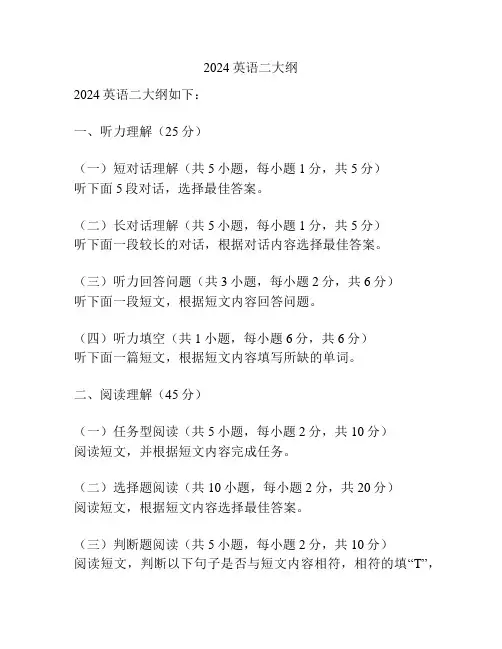
2024英语二大纲
2024英语二大纲如下:
一、听力理解(25分)
(一)短对话理解(共5小题,每小题1分,共5分)
听下面5段对话,选择最佳答案。
(二)长对话理解(共5小题,每小题1分,共5分)
听下面一段较长的对话,根据对话内容选择最佳答案。
(三)听力回答问题(共3小题,每小题2分,共6分)
听下面一段短文,根据短文内容回答问题。
(四)听力填空(共1小题,每小题6分,共6分)
听下面一篇短文,根据短文内容填写所缺的单词。
二、阅读理解(45分)
(一)任务型阅读(共5小题,每小题2分,共10分)
阅读短文,并根据短文内容完成任务。
(二)选择题阅读(共10小题,每小题2分,共20分)
阅读短文,根据短文内容选择最佳答案。
(三)判断题阅读(共5小题,每小题2分,共10分)
阅读短文,判断以下句子是否与短文内容相符,相符的填“T”,
不相符的填“F”。
(四)填空题阅读(共5小题,每小题2分,共10分)
阅读短文,根据短文内容填写所缺的单词。
三、完形填空(15分)
阅读下面一篇短文,从每小题所给的四个选项中选出最佳答案。
四、写作(15分)
根据提示写一篇80-100个词的短文。
以上为2024年英语二大纲的基本结构,具体内容可能根据实
际情况有所调整。

英语(二)学习是一种信仰英语(二)讲义【00015】【内部资料】课程介绍一、课程性质英语(二)是高等教育自学考试各专业(英语专业除外)本科阶段的公共基础课。
三、本资料介绍针对英语(二)试题中第一题到第四题,本资料给出对应的解题技巧及真题举例;第五题和第六题主要涉及到英语语法,本资料将近5 年真题涉及到的语法知识进行总结,详细解释并举对应的真题为例;针对第七题作文部分,本资料给出写作模板及参考例文。
如果您能认真阅读本资料并掌握其中的解题技巧和语法知识,那么您一定能顺利通过考试!目录第一部分语法知识 (4)第一单元名词形容词副词介词 (4)第一章名词 (4)第二章形容词 (5)第三章副词 (8)第四章介词 (10)第二单元谓语动词 (11)第一章系动词 (12)第二章情态动词 (12)第三章时态 (13)第四章英语语态 (16)第三单元非谓语动词 (17)第一章动词不定式 (18)第二章分词 (19)第四单元从句 (21)第一章名词性从句 (21)第二章形容词从句(定语从句) (21)第三章副词从句(状语从句) (21)第五单元并列结构 (22)第二部分应对技巧 (24)第一章阅读判断 (24)第二章阅读选择 (28)第三章概括段落大意和补全句子 (33)第四章填句补文 (36)第五章填词补文 (38)第六章完形补文 (40)第七章短文写作 (41)一、概念第一部分语法知识第一单元名词形容词副词介词第一章名词名词表示人、事物、地点或抽象概念的名称。
如:person,phone,China,time二、用法1.名词作主语和宾语。
●Knowledge is power. (知识就是力量。
)●I love English. (我喜欢英语。
)2.名词可以作定语修饰名词①作定语的名词往往是说明其中名词的材料、用途、时间、地点、内容、类别等②被修饰的名词变复数时,一般情况下,作定语用的名词不需要变为复数形式。
● a diamond ring(一枚钻戒)●orange juice(橙汁)●English lessons(英语课)3.名词分为可数名词和不可数名词,可数名词出现时,要么是复数名词,要么前面加限定词,如冠词(a、an 或 the),不可数名词永远是单数形式。
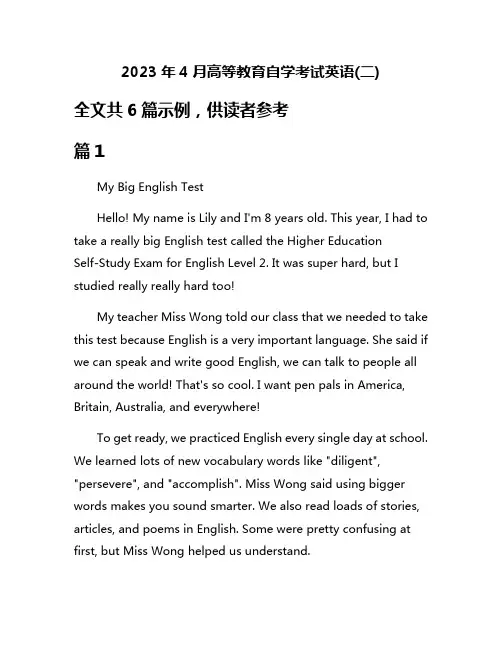
2023年4月高等教育自学考试英语(二)全文共6篇示例,供读者参考篇1My Big English TestHello! My name is Lily and I'm 8 years old. This year, I had to take a really big English test called the Higher EducationSelf-Study Exam for English Level 2. It was super hard, but I studied really really hard too!My teacher Miss Wong told our class that we needed to take this test because English is a very important language. She said if we can speak and write good English, we can talk to people all around the world! That's so cool. I want pen pals in America, Britain, Australia, and everywhere!To get ready, we practiced English every single day at school. We learned lots of new vocabulary words like "diligent", "persevere", and "accomplish". Miss Wong said using bigger words makes you sound smarter. We also read loads of stories, articles, and poems in English. Some were pretty confusing at first, but Miss Wong helped us understand.The writing part was one of the hardest for me. We had to write all sorts of things like letters, essays, reports, and stories. Making sure I used proper grammar with the right verb tenses, punctuation, and everything was super tricky. I made so many silly mistakes at the start! But Miss Wong marked up my writing in red pen, and I learned from my errors.Speaking English was scary too. We had to answer questions, describe pictures, role play conversations, and even give full presentations in front of the class. My hands got all sweaty and I felt butterflies in my tummy! But Miss Wong said being a tiny bit nervous is okay, as long as you prepared properly. The more we practiced, the more confident I got.When the big test day finally came, I was one nervous Nelly! But I reminded myself of all the hard work I'd done. I ate a nice breakfast, did some deep breaths, and headed to the exam hall feeling ready to do my best.The first section was listening. There were recordings of conversations, lectures, news reports, and more to listen to. I had to answer multiple choice questions showing I understood the main ideas and details. It was pretty tough, but I used my skills like blocking out distractions and concentrating extra hard.Next up was reading. We had to read all sorts of passages and answer questions about them. There were stories, articles, advertisements, and more. Some questions asked about specifics details or facts from the text. Others wanted us to make inferences about the author's purpose, tone, and implied meanings between the lines. I read slowly and carefully to make sure I didn't miss any clues.The writing section was still hard for me, but not as scary as I feared. We had to write different types of essays, letters, proposals, and reports. I just took it step-by-step, planning out my ideas first before starting each draft. I made sure to use a range of vocabulary and sentence structures. Most importantly, I double checked that all my grammar and spelling was correct!Finally, there was the speaking part where we had to answer questions and describe pictures, role plays, and topics out loud. When it was my turn, I blocked out the tiny audience and imagined I was just talking to Miss Wong during practice. I spoke loudly, clearly, and with confidence about what I knew.Phew, after what felt like forever, the marathon test was finally over! I was so exhausted, but really proud of myself for pushing through. No matter how I scored, I knew I had worked my absolute hardest.A few weeks later, the results came back - I PASSED! Miss Wong hugged me with the biggest smile on her face. She said my English skills had improved so incredibly much from all my efforts. I may be just a kid, but I accomplished something huge.Now I love showing off my English whenever I can. I'll read books, watch movies, and listen to music in English. I'm going to keep working super hard so one day I can be an English language expert! Who knows, maybe I could even be an English teacher like Miss Wong when I grow up. For now, I'm just proud I never gave up on my dream of learning this amazing global language.The end! Those are my thoughts on the big English test I took. It was no walk in the park, but studying and practicing as hard as I could helped me feel prepared. I'm so glad I stuck with it because now English opens up a whole new world for me. Never stop learning and reaching for your goals! Thanks for reading my story.篇2The Big English Test for Grown-UpsHi there! My name is Lily and I'm 8 years old. My big sister Jessica just took a really important English test called theSelf-Taught Higher Education Examination for English (Level 2). It's a huge test that grown-ups have to pass to get better jobs or go to university. I don't know too much about it, but Jessica told me all about her experience, and I thought it was really interesting!Jessica has been studying so hard for this test for a whole year. She would sit at her desk for hours every night, reading through her big, thick textbooks and practicing writing essays. Sometimes she would make flashcards with vocabulary words and grammar rules to help her memorize everything. It篇3The Big Test for Grown-UpsHey there! Are you a grown-up getting ready for a really big test? My name is Timmy and I'm going to tell you all about this huge exam called the Self-Study English Test that a bunch of adults had to take in April 2023. It was super important for their college learning!So first off, what even is this test? Well, it's kind of like the tests I take at school, but wayyy harder. It checked how good grown-ups were at reading, writing, listening, and speaking inEnglish. And not just any English, but super fancy academic English that's used at universities. Pretty crazy, right?The reading part had all these massive passages about science, history, culture, and other brain-exploding topics. The grown-ups had to read through them and answer questions proving they understood all the difficult vocabulary and ideas.I'm talking words like "quintessential" and "juxtaposition" - makes my head spin just thinking about it!Then there was the writing section where they had to compose a long essay about a really complex prompt. Not just "What I Did Over Summer Vacation", but huge philosophical questions on ethics, technology, the environment, you name it. They had to structure their ideas logically, use elevated language, and incorporate quotes and examples. Phew, I'm getting tired just describing it!As if that wasn't enough, the listening comprehension tested their ability to understand lectures and conversations on academic subjects. They played audio clips of professors rambling on with tons of dates, names, theories and statistics. Afterwards, the grown-ups had to answer all these nitpicky questions about key details and implied meanings. No doodling or daydreaming allowed!But you know what really makes me shudder? The speaking part. Grown-ups had to actually talk out loud and be recorded. They got wildly abstract questions and had to ramble on coherently for minutes using fancy vocabulary, idioms, and transition phrases. Can you imagine?! One mistake and bam - points deducted. No wonder some of them looked terrified!I got to sit in on my dad's study sessions, and let me tell you, it was brutal. He had his face buriedin textbooks, drilling vocab, analyzing sample essays, and listening to practice audios over and over. My mom kept quizzing him on weird academic phrases like "make a case" and "draw a parallel." Even I was losing my marbles!The night before, he could barely sleep. He straightened his tie a million times and quitasking me to quiz him on root words from Latin. Mom made him a super nutritious brain-boosting lunch to keep his energy up. I've never seen him so nervous, not even that time I brought a frog home and let it loose!When he came back home afterwards, you could practically see the exhaustion oozing out of him. He gulped down a giant glass of water and just collapsed on the couch. He mumbled something about havingnightmares of giving a disastrous speech on quarks andmetaphysics. Yikes!A few weeks later, the results finally came out. Dad jumped sky-high when he ripped open that email - his face just lit up with the biggest grin ever! He passed and got a stellar score to boot. We all cheered and hugged him tighter than a bear. That evening, we threw an epic celebratory party with cake, streamers, the whole shebang. Dad vowed to never again take anything that intense for granted.Wow, I don't know how grown-ups manage those kinds of crazy difficult tests! I'll stick to vocab quizzes and book reports for now. If that English exam ever came my way, I'd be shaking like a leaf. Hats off to my dad and all the other adults who pushed through and conquered that monster. Now he gets to keep learning at college - after hewakes up from thiswell-deserved nap, that is!Well, that's all I got on the 2023 Self-Study English Test. Sure am glad I'm just a kid and don't have to worry about that anytime soon! Send my best to all you grown-ups still working hard in school. You're braver than I'll ever be! Now if you'll excuse me, I hear my math homework calling...篇4Hello, My Name is Lily and I'm 8 Years OldI have an older brother named Michael who is in college. He had to take this really big test called the Self-Study Exam for English (Level 2) last April because it's a requirement for his degree program. I got to see him studying a lot for it, so I'll tell you all about my experience watching him prepare!First of all, the exam was really important for Michael because English is not his best subject. He's really good at math and science, but reading and writing in English has always been kind of hard for him. Our parents don't speak English at home, so he had to learn it all at school.The exam had four sections - listening, reading, writing, and translation. Michael said the listening part was the easiest for him because he could understand people talking pretty well. But reading the long passages was really difficult, especially when they used fancy vocabulary words he didn't know.For the writing section, he had to write an essay responding to a prompt. He practiced writing essays for weeks leading up to the exam. Our living room was covered in his essay drafts with my mom's red pen markings all over them! I helped him practice a little bit by reading some of his essays out loud. I told him they were good but a bit too long and rambly.The translation section seemed like the hardest part to me. Michael had to translate passages back and forth between English and Chinese. He spent so many hours poring over his translation dictionaries and making flashcards with difficult vocabulary words. Sometimes he would test me by showing me a flashcard and having me try to define or translate the word. I didn't know most of them!As the exam day got closer, Michael seemed more and more stressed out. He literally had stacks of exam prep books covering our kitchen table. I remember he would make me quiz him on things while he wolfed down his breakfast in the morning before rushing out the door.On the morning of the big exam day, my parents made him a special big breakfast with all his favorite foods to wish him luck. Michael looked exhausted already and the exam didn't even start until afternoon! After we saw him off at the exam site, my parents and I went to the park to walk around and get our minds off worrying about how he was doing.When Michael finally got home after the 3-hour exam, he was one tired puppy! He flopped down on the couch and didn't move for like an hour. I was really curious about how it went, so I kept pestering him with questions. He said it was okay but therewere some reading passages that were just impossible for him to understand fully.We all had to wait a few weeks for Michael's exam results to come out. When they finally did, we were so relieved to see that he passed! I could tell he felt proud of himself for getting through such a hard test, even though his score wasn't amazing. My parents took us all out for a celebratory dinner at Michael's favorite restaurant.Overall, watching my brother study for the English Level 2 exam made me realize how hard it is to truly master another language, especially for important academic tests. I have a new appreciation for how much time and effort students like Michael have to put in to achieve their goals. I'll be sure to listen more carefully in my English classes at school from now on!篇5My School DaysHi there! My name is Timmy and I'm a 3rd grader at Sunnyville Elementary School. School is so much fun and I learn lots of cool stuff every day. Let me tell you all about it!We start off the day by lining up outside before the bell rings. My best friends Tommy and Susie are usually right behind me. We like to chat and joke around while we wait. Once the bell rings, we all go inside and sit at our desks. Our teacher Mrs. Anderson is really nice. She has pretty red hair and always wears a friendly smile.The first subject we have is reading. We take turns reading stories and poems out loud from our reading books. I like the funny stories the best because they make me laugh. After we read, Mrs. Anderson asks us questions about what we read to make sure we understood. If we get stuck, she helps explain things.Next up is math time! I'm not gonna lie, math is pretty hard for me sometimes. We learn about addition, subtraction, multiplication, and division. Numbers can get really confusing when you have to borrow and carry and all that. But Mrs. Anderson is a great teacher and makes it as easy as possible. We play games and use counting blocks to help us learn.After math, we get to go outside for recess! Recess is my favorite part of the day. I love running around on the playground with my friends. We play tag, kickball, jump rope, you name it. Sometimes I just lay in the grass and watch the clouds float by.That's really relaxing. When the recess bell rings, we have to line up again. I'm always a sweaty mess!Lunch time is rad. I get my tray of food from the cafeteria ladies and then head to my usual table. Tommy, Susie, and my other buddies Jamie and Michael are always there saving me a seat. We laugh, tell jokes, and talk about kid stuff while we eat. The pizza is my favorite cafeteria food. Yum!In the afternoon, we have science, social studies, art, and music. Science is cool because we get to do experiments and learn about nature. In social studies, we learn about history, geography, and different cultures around the world. Art class lets me be creative and get messy with paints and clay. Music is great too - we sing songs and learn about notes and rhythms.At the end of the day, it's time to pack up our backpacks and get ready to go home. Waiting for my mom to pick me up is the worst part. I'm always so antsy to get out of there! Once she arrives, I give her a big hug and we go home. She asks me about my day on the drive and I tell her everything.After I get home, I have a snack and take a little break to just veg out for a bit. Then it's homework time unfortunately. I have to read, write sentences, do math problems, and maybe a projector two. Once my homework is finished, I can finally go out and play until dinner!School days are awesome but also tiring. I pack so much learning and fun into just one day. I'm making amazing memories and great friends. In a few years, I'll be off to middle school and then high school after that. Who knows what the future will hold! But for now, I'm just enjoying being a kid and a third grade student. Life is good!篇6My English Exam Adventure!Hi there! My name is Lily and I'm 10 years old. I just took the big English exam for my self-taught higher education program. It was a really tough test, but I tried my best! Let me tell you all about my exciting exam day.It was a sunny Saturday morning when my mom woke me up bright and early. "Time to get ready for your English exam!" she said cheerfully. I stretched my arms and yawned. Even though I was a little nervous, I had been studying really hard for weeks.After getting dressed, I had a yummy breakfast of pancakes and orange juice to give me energy for the big test. Then mombraided my hair and I put on my lucky sneakers. "You've got this, Lily!" dad said, giving me a high five. I smiled, feeling proud of all my hard work.The test was at the big high school near our house. When we arrived, there were lots of other kids my age arriving too. Some looked nervous, but others seemed confident. I just focused on taking deep breaths like my teacher taught me.Finally, it was time to go inside. The exam room was huge with rows and rows of desks. A nice lady showed me where to sit and I carefully took out my pencils and eraser. I could do this!The first part of the exam was listening comprehension. We had to listen to recordings and answer questions about what we heard. There were conversations between people as well as speeches and news reports. I listened very carefully and tried to write down all the key details.Next up was the reading section. We had passages about all kinds of topics - science, history, culture, literature. The questions were pretty tricky, asking us to make inferences and analyze the writers' perspectives. I re-read the passages slowly and tried my best to find the evidence to support my answers.After a short break to have a snack and some water, it was time for the writing section - the part I struggled with most in my practice tests. We had to write an essay arguing for or against an opinion. The prompt was "Schools should require all students to learn a second language from kindergarten."I thought about it carefully, making a little outline first. I decided to argue in favor of learning languages early. In my introduction, I talked about the cognitive benefits of being bilingual at a young age. For my body paragraphs, I discussed how it helps cultural understanding, improves career opportunities, and provides an excellent foundation for learning even more languages later on. I tried to include lots of examples and details from my own experience learning English.For the very last part, we had to speak with an examiner one-on-one and have a conversation. The examiner asked me questions like "What are your favorite subjects in school?" and "How do you like to spend your free time?" I just imagined I was talking to one of my friends and tried to give clear, detailed responses. Phew, I was finally done!As I walked out of the exam room, I felt both relieved and proud of myself for giving it my all. All that studying haddefinitely paid off. Now all I can do is wait patiently for my results. Wish me luck!Even though the test was really challenging, I'm so glad I got this incredible opportunity. Learning English has opened up a whole new world for me - I can read amazing books, watch interesting movies, and hopefully one day travel the world. An experience like this exam will help prepare me for future challenges too. If I can tackle this huge test at just 10 years old, I know I can accomplish anything I set my mind to!So that's the story of my big English exam day. It was difficult but rewarding. I felt like a tiny fish in a big pond, but by believing in myself I was able to swim, swim, swim! Now I'm headed home to celebrate with my favorite dinner - pizza! Thanks for reading, friends!。
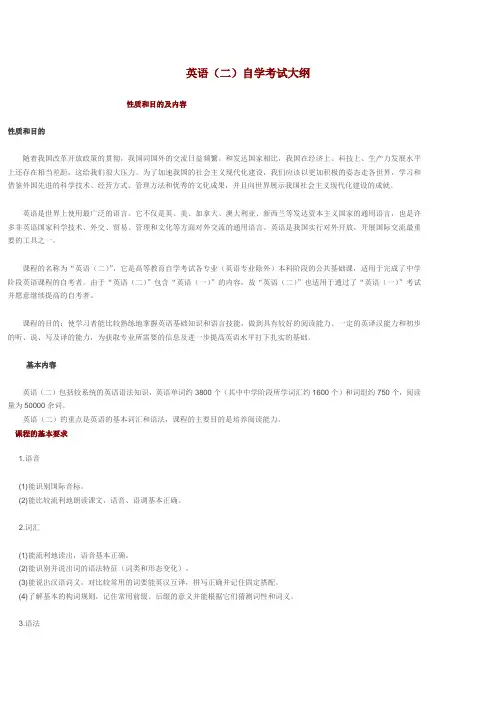
英语(二)自学考试大纲性质和目的及内容性质和目的随着我国改革开放政策的贯彻,我国同国外的交流日益频繁。
和发达国家相比,我国在经济上、科技上、生产力发展水平上还存在相当差距,这给我们很大压力。
为了加速我国的社会主义现代化建设,我们应该以更加积极的姿态走各世界,学习和借鉴外国先进的科学技术、经营方式、管理方法和优秀的文化成果,并且向世界展示我国社会主义现代化建设的成就。
英语是世界上使用最广泛的语言。
它不仅是英、美、加拿大、澳大利亚、新西兰等发达资本主义国家的通用语言,也是许多非英语国家科学技术、外交、贸易、管理和文化等方面对外交流的通用语言。
英语是我国实行对外开放,开展国际交流最重要的工具之一。
课程的名称为“英语(二)”,它是高等教育自学考试各专业(英语专业除外)本科阶段的公共基础课,适用于完成了中学阶段英语课程的自考者。
由于“英语(二)”包含“英语(一)”的内容,故“英语(二)”也适用于通过了“英语(一)”考试并愿意继续提高的自考者。
课程的目的:使学习者能比较熟练地掌握英语基础知识和语言技能,做到具有较好的阅读能力、一定的英译汉能力和初步的听、说、写及译的能力,为获取专业所需要的信息及进一步提高英语水平打下扎实的基础。
基本内容英语(二)包括较系统的英语语法知识,英语单词约3800个(其中中学阶段所学词汇约1600个)和词组约750个,阅读量为50000余词。
英语(二)的重点是英语的基本词汇和语法,课程的主要目的是培养阅读能力。
课程的基本要求1.语音(1)能识别国际音标。
(2)能比较流利地朗读课文,语音、语调基本正确。
2.词汇(1)能流利地读出,语音基本正确。
(2)能识别并说出词的语法特征(词类和形态变化)。
(3)能说出汉语词义,对比较常用的词要能英汉互译,拼写正确并记住固定搭配。
(4)了解基本的构词规则,记住常用前缀、后缀的意义并能根据它们猜测词性和词义。
3.语法(1)对大纲规定的英语语法体系从整体上应有比较清楚的了解。
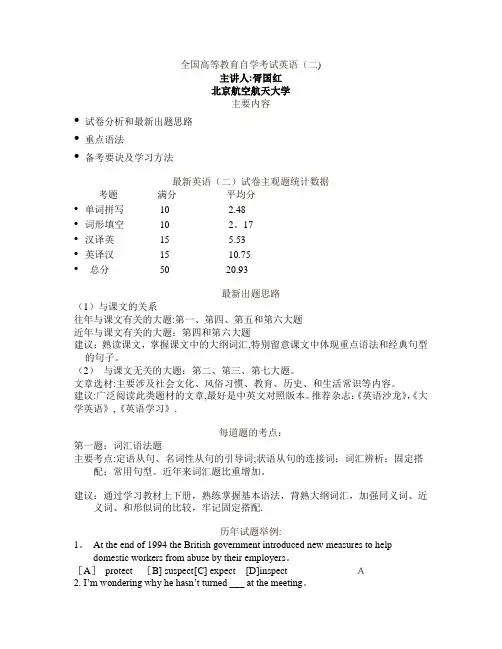
全国高等教育自学考试英语(二)主讲人:胥国红北京航空航天大学主要内容•试卷分析和最新出题思路•重点语法•备考要诀及学习方法最新英语(二)试卷主观题统计数据考题满分平均分•单词拼写10 2.48•词形填空10 2。
17•汉译英15 5.53•英译汉15 10.75•总分50 20.93最新出题思路(1)与课文的关系往年与课文有关的大题:第一、第四、第五和第六大题近年与课文有关的大题:第四和第六大题建议:熟读课文,掌握课文中的大纲词汇,特别留意课文中体现重点语法和经典句型的句子。
(2)与课文无关的大题:第二、第三、第七大题。
文章选材:主要涉及社会文化、风俗习惯、教育、历史、和生活常识等内容。
建议:广泛阅读此类题材的文章,最好是中英文对照版本。
推荐杂志:《英语沙龙》,《大学英语》,《英语学习》.每道题的考点:第一题:词汇语法题主要考点:定语从句、名词性从句的引导词;状语从句的连接词;词汇辨析;固定搭配;常用句型。
近年来词汇题比重增加。
建议:通过学习教材上下册,熟练掌握基本语法,背熟大纲词汇,加强同义词、近义词、和形似词的比较,牢记固定搭配.历年试题举例:1。
At the end of 1994 the British government introduced new measures to help____domestic workers from abuse by their employers。
[A]protect [B] suspect [C] expect [D]inspect A2. I’m wondering why he hasn’t turned ___ at the meeting。
[A]down [B]up [C] out [D] over B3。
By using both ears one can tell the direction ___ a soundcomes。
[A]in which [B]from which[C]over which[D] with which B第二题:完型填空题主要考点:除了第一大题已提到的考点外,还注重考察介词、连词、副词、代词等虚词的用法。
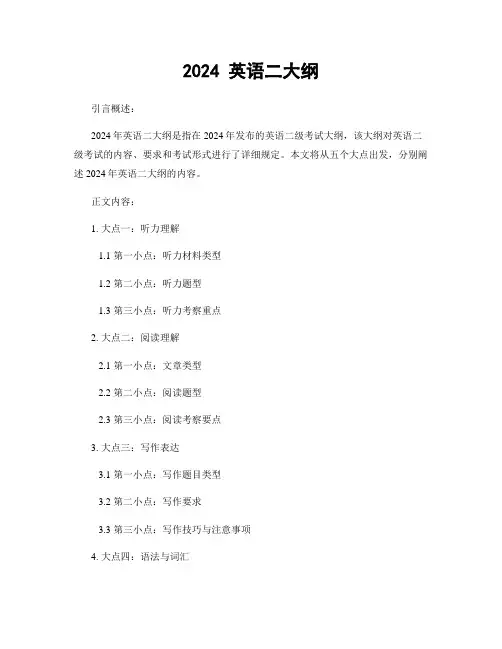
2024 英语二大纲
引言概述:
2024年英语二大纲是指在2024年发布的英语二级考试大纲,该大纲对英语二级考试的内容、要求和考试形式进行了详细规定。
本文将从五个大点出发,分别阐述2024年英语二大纲的内容。
正文内容:
1. 大点一:听力理解
1.1 第一小点:听力材料类型
1.2 第二小点:听力题型
1.3 第三小点:听力考察重点
2. 大点二:阅读理解
2.1 第一小点:文章类型
2.2 第二小点:阅读题型
2.3 第三小点:阅读考察要点
3. 大点三:写作表达
3.1 第一小点:写作题目类型
3.2 第二小点:写作要求
3.3 第三小点:写作技巧与注意事项
4. 大点四:语法与词汇
4.1 第一小点:语法知识点
4.2 第二小点:词汇考察范围
4.3 第三小点:语法与词汇练习建议
5. 大点五:口语交际
5.1 第一小点:口语题目类型
5.2 第二小点:口语表达要求
5.3 第三小点:口语练习建议
总结:
综上所述,2024年英语二大纲涵盖了听力理解、阅读理解、写作表达、语法与词汇以及口语交际五个大点。
在听力理解方面,考生需熟悉不同类型的听力材料和题型,并重点关注考察重点。
阅读理解要求考生掌握不同类型的文章和题型,并注意阅读考察要点。
写作表达要求考生熟悉不同类型的写作题目,掌握写作要求,并注意写作技巧和注意事项。
语法与词汇部分考察了语法知识点和词汇范围,建议考生进行相关练习。
口语交际要求考生熟悉口语题目类型,掌握口语表达要求,并进行口语练习。
考生在备考过程中应根据大纲的要求有针对性地进行学习和练习,以取得更好的考试成绩。
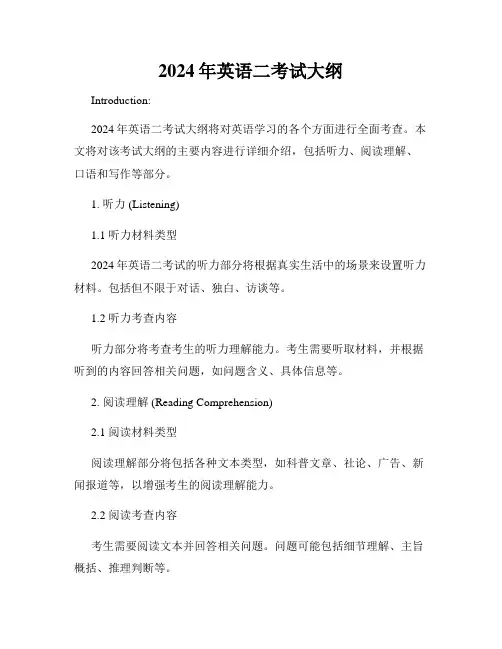
2024年英语二考试大纲Introduction:2024年英语二考试大纲将对英语学习的各个方面进行全面考查。
本文将对该考试大纲的主要内容进行详细介绍,包括听力、阅读理解、口语和写作等部分。
1. 听力 (Listening)1.1 听力材料类型2024年英语二考试的听力部分将根据真实生活中的场景来设置听力材料。
包括但不限于对话、独白、访谈等。
1.2 听力考查内容听力部分将考查考生的听力理解能力。
考生需要听取材料,并根据听到的内容回答相关问题,如问题含义、具体信息等。
2. 阅读理解 (Reading Comprehension)2.1 阅读材料类型阅读理解部分将包括各种文本类型,如科普文章、社论、广告、新闻报道等,以增强考生的阅读理解能力。
2.2 阅读考查内容考生需要阅读文本并回答相关问题。
问题可能包括细节理解、主旨概括、推理判断等。
3. 口语 (Oral)3.1 口语考查形式2024年英语二考试的口语部分将包括个人陈述和问答环节,以考查考生的口语表达能力和交际能力。
3.2 口语考查内容考生需要就指定的话题进行个人陈述,并回答与话题相关的问题。
在个人陈述中,考生需要表达自己的观点、理由和举例等。
4. 写作 (Writing)4.1 写作题目类型写作部分将设置不同类型的写作题目,如议论文、说明文、图表描述等,以考查考生的写作能力和表达能力。
4.2 写作考查内容考生需要就指定的题目进行写作,并表达自己的观点和理由。
写作部分将注重考生的逻辑思维和组织能力,以及语言表达的准确性和流畅性。
Conclusion:本文对2024年英语二考试大纲进行了详细介绍,涵盖了听力、阅读理解、口语和写作等部分。
该考试大纲旨在全面考查考生的英语学习能力,包括听力理解、阅读理解、口语表达和写作能力。
希望考生能够针对该大纲进行有针对性的备考,以取得优异的考试成绩。
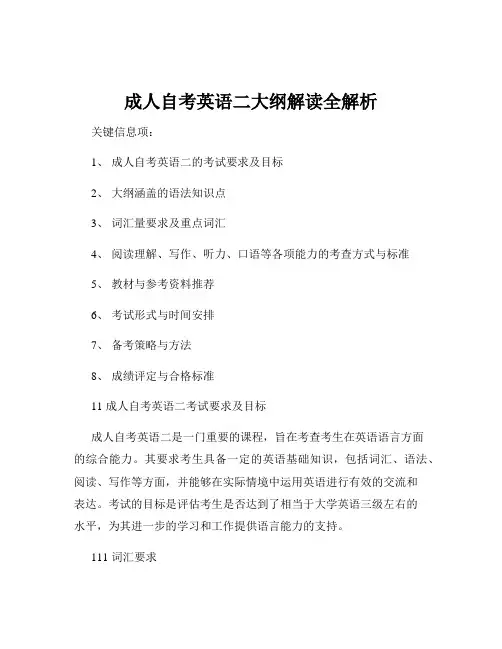
成人自考英语二大纲解读全解析关键信息项:1、成人自考英语二的考试要求及目标2、大纲涵盖的语法知识点3、词汇量要求及重点词汇4、阅读理解、写作、听力、口语等各项能力的考查方式与标准5、教材与参考资料推荐6、考试形式与时间安排7、备考策略与方法8、成绩评定与合格标准11 成人自考英语二考试要求及目标成人自考英语二是一门重要的课程,旨在考查考生在英语语言方面的综合能力。
其要求考生具备一定的英语基础知识,包括词汇、语法、阅读、写作等方面,并能够在实际情境中运用英语进行有效的交流和表达。
考试的目标是评估考生是否达到了相当于大学英语三级左右的水平,为其进一步的学习和工作提供语言能力的支持。
111 词汇要求考生应掌握约 3500 个左右的常用词汇,以及一定数量的短语和习惯用语。
重点词汇包括动词、名词、形容词、副词等词性,并且能够正确理解和运用这些词汇进行书面和口头表达。
112 语法知识点语法方面,涵盖了时态、语态、虚拟语气、从句、非谓语动词、主谓一致等重要内容。
考生需要熟练掌握这些语法规则,能够在句子理解和写作中正确运用,避免语法错误。
12 大纲涵盖的阅读理解能力考查阅读理解是考试的重点之一,要求考生能够读懂一般性题材的英语文章,理解文章的主旨大意、细节信息、推理判断、作者观点等。
阅读材料包括记叙文、说明文、议论文等不同文体,考生需要具备一定的阅读速度和理解能力。
121 阅读技巧与方法为了提高阅读理解能力,考生需要掌握一些阅读技巧,如快速浏览、略读、精读等。
同时,要学会根据上下文猜测生词的含义,提高对长难句的分析能力。
122 阅读练习建议考生应进行大量的阅读练习,选择适合自己水平的英语读物,如英语报纸、杂志、小说等,并进行有针对性的阅读训练,提高阅读的准确性和速度。
13 写作能力考查写作部分要求考生能够根据给定的题目或情景,用英语写出一篇不少于 100 词的短文。
作文内容应完整、连贯、语法正确、表达清晰。
131 写作体裁与话题写作体裁包括书信、通知、议论文、记叙文等。
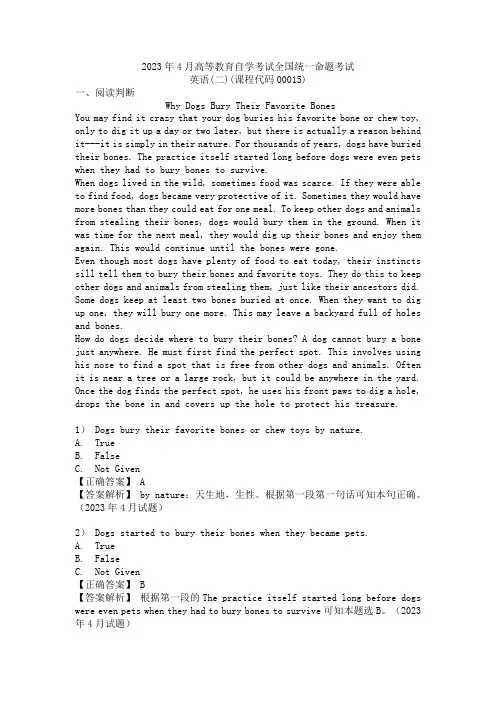
2023年4月高等教育自学考试全国统一命题考试英语(二)(课程代码00015)一、阅读判断Why Dogs Bury Their Favorite BonesYou may find it crazy that your dog buries his favorite bone or chew toy, only to dig it up a day or two later, but there is actually a reason behind it---it is simply in their nature. For thousands of years, dogs have buried their bones. The practice itself started long before dogs were even pets when they had to bury bones to survive.When dogs lived in the wild, sometimes food was scarce. If they were able to find food, dogs became very protective of it. Sometimes they would have more bones than they could eat for one meal. To keep other dogs and animals from stealing their bones, dogs would bury them in the ground. When it was time for the next meal, they would dig up their bones and enjoy them again. This would continue until the bones were gone.Even though most dogs have plenty of food to eat today, their instincts sill tell them to bury their bones and favorite toys. They do this to keep other dogs and animals from stealing them, just like their ancestors did. Some dogs keep at least two bones buried at once. When they want to dig up one, they will bury one more. This may leave a backyard full of holes and bones.How do dogs decide where to bury their bones? A dog cannot bury a bone just anywhere. He must first find the perfect spot. This involves using his nose to find a spot that is free from other dogs and animals. Often it is near a tree or a large rock, but it could be anywhere in the yard. Once the dog finds the perfect spot, he uses his front paws to dig a hole, drops the bone in and covers up the hole to protect his treasure.1) Dogs bury their favorite bones or chew toys by nature.A. TrueB. FalseC. Not Given【正确答案】 A【答案解析】 by nature:天生地,生性。
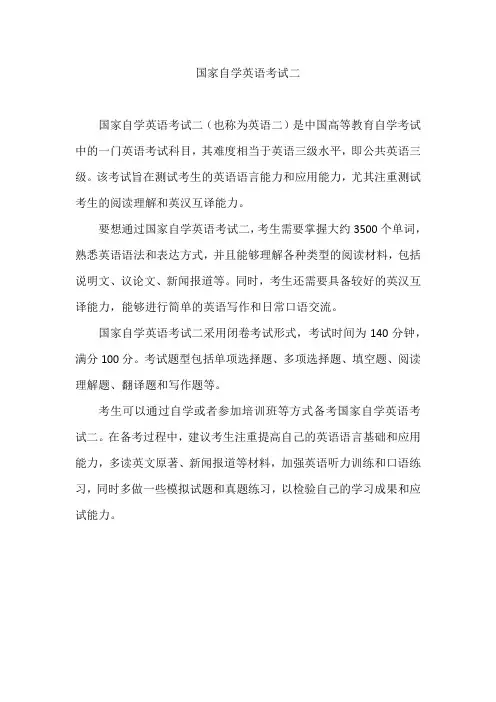
国家自学英语考试二
国家自学英语考试二(也称为英语二)是中国高等教育自学考试中的一门英语考试科目,其难度相当于英语三级水平,即公共英语三级。
该考试旨在测试考生的英语语言能力和应用能力,尤其注重测试考生的阅读理解和英汉互译能力。
要想通过国家自学英语考试二,考生需要掌握大约3500个单词,熟悉英语语法和表达方式,并且能够理解各种类型的阅读材料,包括说明文、议论文、新闻报道等。
同时,考生还需要具备较好的英汉互译能力,能够进行简单的英语写作和日常口语交流。
国家自学英语考试二采用闭卷考试形式,考试时间为140分钟,满分100分。
考试题型包括单项选择题、多项选择题、填空题、阅读理解题、翻译题和写作题等。
考生可以通过自学或者参加培训班等方式备考国家自学英语考试二。
在备考过程中,建议考生注重提高自己的英语语言基础和应用能力,多读英文原著、新闻报道等材料,加强英语听力训练和口语练习,同时多做一些模拟试题和真题练习,以检验自己的学习成果和应试能力。
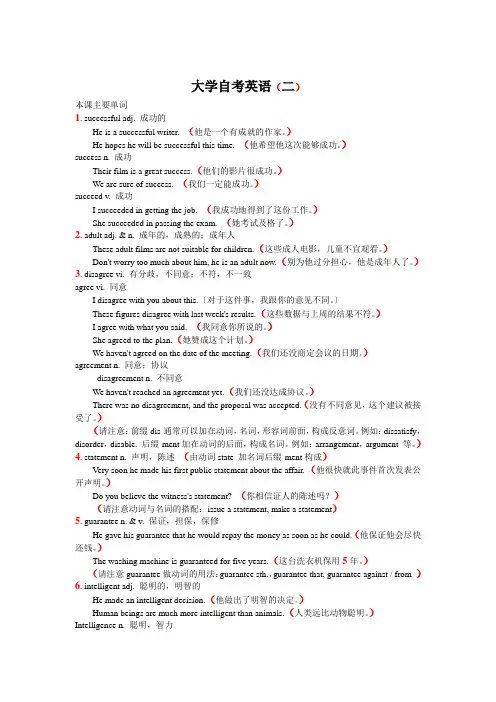
大学自考英语(二)本课主要单词1. successful adj. 成功的He is a successful writer. (他是一个有成就的作家。
)He hopes he will be successful this time. (他希望他这次能够成功。
)success n. 成功Their film is a great success.(他们的影片很成功。
)We are sure of success. (我们一定能成功。
)succeed v. 成功I succeeded in getting the job. (我成功地得到了这份工作。
)She succeeded in passing the exam. (她考试及格了。
)2. adult adj. & n. 成年的,成熟的;成年人These adult films are not suitable for children.(这些成人电影,儿童不宜观看。
)Don't worry too much about him, he is an adult now.(别为他过分担心,他是成年人了。
)3. disagree vi. 有分歧,不同意;不符,不一致agree vi. 同意I disagree with you about this.〔对于这件事,我跟你的意见不同。
〕These figures disagree with last week's results.(这些数据与上周的结果不符。
)I agree with what you said. (我同意你所说的。
)She agreed to the plan.(她赞成这个计划。
)We haven't agreed on the date of the meeting.(我们还没商定会议的日期。
)agreement n. 同意;协议disagreement n. 不同意We haven't reached an agreement yet.(我们还没达成协议。
自考英语二自学教程书
以下是几本自考英语二自学教程书:
1. 《英语(二)自学教程》(张敬源、张虹著,2012年版)
2. 《英语(二)自学教程+自考通试卷》(套装共2本,张敬源、张虹著)
3. 《英语(二)自学教程附自学考试大纲》(张敬源、张虹著)
4. 《英语(二)自学教程全真模拟卷》(张敬源、张虹著)
5. 《英语(专升本)自学考试教材》(张敬源著)
6. 《自考英语二历年真题卷公共课自考本科》(03708中国近代史纲要、03709马克思主义基本原理概论真题详细解析冲刺试卷真题汇编)
7. 《英语(二)教材+自考通考纲+自考通试卷附串讲小册子附赠试听视频课程》(套装共3册)
以上书籍有不同的版本和作者,可以结合个人需求选择适合自己的自学教程书。
学位英语自学考试英语二The Importance of Self-study for the English Proficiency Test (English II)。
Introduction:Self-study plays a crucial role in preparing for the English Proficiency Test, especially for English II. This article aims to highlight the significance of self-study and provide effective strategies for success in the exam. By following these guidelines, test-takers can enhance their language skills and achieve better results.Body:1. Understanding the Exam Structure and Requirements:Before commencing self-study, it is essential to thoroughly understand the exam structure and requirements. This includes familiarizing oneself with the different sections, such as reading comprehension, vocabulary, grammar, and writing. By knowing what to expect, test-takers can tailor their study plan accordingly and allocate sufficient time for each section.2. Developing a Study Plan:Creating a study plan is crucial for effective self-study. Test-takers should allocate specific time slots for each section of the exam, focusing on their weaker areas. By following a structured plan, individuals can ensure comprehensive coverage of all topics and allocate sufficient time for practice and revision.3. Enhancing Vocabulary Skills:A strong vocabulary is essential for success in English II. Test-takers should dedicate time to expand their vocabulary by learning new words, idioms, and phrases. Utilizing flashcards, online resources, and word association techniques can significantly improve vocabulary retention. Regular practice using vocabulary exercises and quizzes can also help reinforce learning.4. Improving Reading Comprehension:The reading comprehension section requires strong analytical skills and a good understanding of the passage. Test-takers should practice reading various texts, such as newspaper articles, academic journals, and literary works. While reading, it is crucial to identify the main ideas, supporting details, and the author's tone. Practicing with sample questions and timed exercises can enhance reading speed and comprehension.5. Mastering Grammar and Sentence Structure:A solid foundation in grammar and sentence structure is vital for English II. Test-takers should review grammar rules, practice sentence construction, and familiarize themselves with common grammatical errors. Online grammar exercises, grammar books, and language learning apps can be valuable resources for self-study. Regular practice and error analysis can help identify and rectify grammar weaknesses.6. Writing Skills and Essay Preparation:The writing section requires test-takers to express their ideas clearly and coherently. To improve writing skills, individuals should practice writing essays on various topics, paying attention to organization, grammar, and vocabulary usage. Seeking feedback from peers or instructors can provide valuable insights for improvement. Additionally, analyzing sample essays and understanding the evaluation criteria can help test-takers align their writing style with the exam requirements.7. Mock Tests and Time Management:Regularly taking mock tests under exam conditions is crucial for self-assessment and time management. Test-takers should simulate the exam environment, strictly adhere to time limits, and analyze their performance afterward. This practice enables individuals to identify strengths and weaknesses, allocate time efficiently, and manage exam-related stress effectively.Conclusion:Self-study is a fundamental aspect of preparing for the English Proficiency Test, especially English II. By understanding the exam structure, developing a study plan, focusing on vocabulary, improving reading comprehension, mastering grammar, practicing writing skills, and taking mock tests, test-takers can enhance their language proficiency and achieve better results. Dedication, consistency, and effective self-study strategies are the keys to success in the English Proficiency Test.。
小标题英二大纲
以下是大纲样例,以供参考:
一、考试性质
英语二考试是为高等学校和科研院所招收专业学位硕士研究生而设置的具有选拔性质的全国统一入学考试科目。
其目的是科学、公平、有效地测试考生对英语语言的运用能力,评价的标准是高等学校非英语专业本科毕业生所能达到的及格或及格以上水平,以保证被录取者具有一定的英语水平,并有利于各高等学校和科研院所在专业上择优选拔。
二、考试形式和试卷结构
1. 考试形式:考试形式为闭卷、笔试,考试时间为180分钟,满分为100分。
2. 试卷结构:试卷由四部分组成,包括试卷一、试卷二、试卷三和试卷四。
试卷一包括听力、阅读理解和写作,试卷二包括翻译和完形填空,试卷三和试卷四为阅读理解和写作。
三、考查内容
1. 语言知识:考生应掌握英语语言的基本语法、词汇和常用表达方式。
2. 阅读理解:考生应具备一定的阅读能力和理解能力,能够阅读英文文章并理解其主旨、细节和推理。
3. 写作:考生应具备一定的写作能力,能够根据给定的题目或情境撰写一篇符合要求的短文。
4. 翻译:考生应具备一定的翻译能力,能够将英文句子或段落翻译成中文,并保持原文的准确性和流畅性。
5. 完形填空:考生应具备一定的词汇量和语言逻辑能力,能够完成一篇短文中的填空题。
四、考试目标
英语二考试的目标是测试考生的英语水平是否达到高等学校非英语专业本科毕业生所能达到的及格或及格以上水平,以保证被录取者具有一定的英语水平,并有利于各高等学校和科研院所在专业上择优选拔。
有关“英语二”的考试大纲
英语二考试大纲是针对英语二考试所制定的考试标准和要求的详细说明。
有关“英语二”的考试大纲如下:
1.语言知识:要求考生掌握约3500个英语词汇和短语,包括基本语法和句型结构。
2.阅读理解:考生需要能够理解各类文章,包括说明文、议论文、新闻报道等,并能够根
据文章内容进行推理、判断和总结。
3.翻译:考生需要能够将英文文章翻译成中文,同时能够将中文文章或段落翻译成英文。
4.写作:考生需要能够撰写不同类型的英文文章,包括信函、通知、报告等,并能够表达
自己的观点和想法。
5.听力:考生需要能够听懂英语口语,包括日常对话、新闻报道等,并能够理解说话者的
意图和态度。
6.口语:考生需要能够用英语进行口头表达和交流,包括自我介绍、发表观点、讨论问题
等。
2022年4月高等教育自学考试全国统一命题考试英语(二)(课程代码00015)第一部分:阅读判断(第1~10题,每题1分,共10分)下面的短文后列出了10个句子,请根据短文的内容对每个句子作出判断:如果该句提供的是正确信息,选择A;如果该句提供的是错误信息,选择B;如果该句的信息文中没有提及,选择C。
Famous BrandsWhy do we always buy certain shoes or clothes that have a famous brand? Why do wehave to copy other people?The people we often admire the most are those who have theirown styles. They don't want to copy someone else's.Big companies give free products to famous people, such as sportsmen and movie stars.They intend to get people like you to buy their products. When you spend a lot of money onan expensive pair of shoes,they may not suit you. You might enjoy more if you buysomething else at the same price! Besides the brand, you may want to know why they areasking that price. The brand may sometimes have nothing to do with the quality of theproduct.lt can be of bad quality and badly made. This makes you think why it has the designer'sname on it. It's very important for designers to use their creative talent to make somethingbeautiful. But today the making of money has become more important. So they just copyother products and their standards fall.Creative products should be available to people at a reasonable price.In this way, big companies wouldn't be able to dominate(控制)the market and encourage people to spend toomuch money on their products.They are dominating the market by telling us what to buy.If you go into a toy shop orchildren's clothes shop, youll find the whole section for girls is almost all pink.Because of thedomination of big companies, the original arts and crafts are beginning to die out. It would bea real shame if these arts and crafts were to disappear.1.We like the people with their own styles.A.TrueB. FalseC. Not Given2.Big companies give famous people free products to attract buyers.A. TrueB. FalseC. Not Given3.Expensive products often suit people better.A.TrueB. FalseC. Not Given4.Famous brand products are of better quality.A. TrueB.FalseC. Not Given5.Creativity is important in making good products.A.TrueB. FalseC. Not Given6.Famous designers work overtime.A.TrueB. FalseC. Not Given7.Young people like creative products.A.TrueB. FalseC. Not Given8.Big companies price their products reasonably.A.TrueB. FalseC. Not Given9.Mothers prefer to shop for children's clothes.A.TrueB. FalseC. Not Given10.The domination of big companies does harm to creativity.A.TrueB.FalseC. Not Given第二部分:阅读选择(第11~15题,每题2分,共10分)阅读下面短文,请从短文后所给各题的4个选项(A、B、C、D)中选出1个最佳选项。
序言本书根据自考英语(二)教学大纲编写,共收录4500词汇。
书中的每个英文单词都添加了标准的英式音标以及每个单词最常用的、一定需要掌握的,且最与大纲要求贴近的中文意思,供您在英语学习以及备考过程中使用,帮助您在复习备考过程中节省时间,有效提高复习效率。
需要特别提醒的是: 本书跟传统词汇书相同之处在于仍然按照字母表顺序,为的是便于您在复习和日常练习过程中快速查找单词;而不同之处在于,编者根据单词的难易程度,把4500个单词分成了四个等级:其中一颗星为最容易, 两颗星,三颗星,四颗星按顺序依次增加难度, 为的是便于您在学习中可以根据自己的水平,分级背诵复习,更好地提高记忆单词的效率.建议大家在开始记忆单词之前,把整个词汇书浏览一遍, 您会发现,在一颗星,两颗星中有很多单词是你非常熟悉因而不用再花时间记忆的,比如:a, about, apple, any等基础词汇。
您可以把这样的单词全部划掉,只留下您需要花时间记忆的单词,这样可以大大节约时间,提高效率。
同时还建议您使用这本大纲词汇进行词汇复习时,不仅关注其拼写方式及中文释义,更应着眼于每个词的词性,对于词性的熟知也是英语(二)考试中夺取高分的关键之一。
希望这本大纲词汇可以在您复习过程中祝您一臂之力,发挥其效果。
一级able [ˈeɪbl] adj. 能够的;有能力的about [əˈbaʊt] prep. 关于;大约above [əˈbʌv] prep. 超过;在…之上accept [əkˈsept] vt. 接受ache [eɪk] n. 疼痛across [əˈkrɔs] prep. 穿过;横穿act [ækt] vt.& vi. 行动;做add [æd] vt. 增加address [əˈdres] n.地址advice [ədˈvaɪs] n. 劝告,忠告advise [ədˈvaɪz] vt. 建议afraid [əˈfreɪd] adj. 害怕的;担心的again [əˈgen] adv. 又;再说against [əˈgenst] prep. (表示态度)反对age [eɪdʒ] n. 年龄ago [əˈɡəu] adv.以前;过去的;之前agree [əˈgri:] vt.& vi.同意,赞同ahead [əˈhed] adv.在前面aim [eɪm] vt.& vi.(以…)瞄准,针对air [eə(r)] n.天空airpor t [ˈɛəpɔ:t] n.机场airway [ˈeəˌweɪ] n.航线also [ˈɔ:lsəu] conj.另外although [ɔ:lˈðəu] conj.尽管;虽然altogether [ˌɔ:ltəˈgeðə(r)] adv.全部地always [ˈɔ:lweɪz] adv.总是,老是an [æn,ən] art.任一某一;一个a.m./A.M./AM [ˌeɪˈem] abbr.上午,午前ahead [əˈhed] adv.在前面aim [eɪm] vt.& vi.(以…)瞄准,针对air [eə(r)] n.天空airport [ˈɛəpɔ:t] n.机场airway [ˈeəˌweɪ] n.航线also [ˈɔ:lsəu] conj.另外although [ɔ:lˈðəu] conj.尽管;虽然altogether [ˌɔ:ltəˈgeðə(r)] adv.全部地always [ˈɔ:lweɪz] adv.总是,老是an [æn,ən] art.任一某一;一个a.m./A.M./AM [ˌeɪˈem] abbr.上午,午前alike [əˈlaɪk] adj.同样的,相似的alive [əˈlaɪv] adj.活着的;活泼的all [ɔ:l] adj.全部的;一切的allow [əˈlaʊ] vt.允许almost [ˈɔ:lməʊst] adv.几乎,差不多alone [əˈləun] adj.单独的;独一无二的along [əˈlɔŋ] prep.沿着;顺着alongside [əˌlɒŋˈsaɪd] prep.在…旁边aloud [əˈlaʊd] adv.高声;大声among/amongst [əˈmʌŋ]在…之内and [ənd] conj. 和,与anger [ˈæŋgə(r)] n. 生气animal [ˈænɪml] n. 动物another [əˈnʌðə(r)] adj. 又一个answer [ˈɑ:nsə(r)] vt.& vi. 答复;解答ant [ænt] n. 蚂蚁apple [ˈæpl] n. 苹果any [ˈeni] pron. 任何;无论哪个anybody [ˈenibɒdi] pron. 任何人anyone [ˈeniwʌn] pron. 任何人anything [ˈeniθɪŋ] pron. 任何东西April [ˈeɪprəl] n. 四月Asia[ˈeɪʃə] n. 亚洲ask[ɑ:sk] vt.& vi. 问,询问asleep[əˈsli:p] adj. 睡着的area [ˈɛəriə] n. 地区;区域arm [ɑ:m] n. 臂army [ˈɑ:mi] n. 军队around [əˈraʊnd] prep. 围绕;在附近arrival [əˈraɪvl] n. 到达,抵达arrive [əˈraɪv] vi. 到达art [ɑ:t] n. 艺术;艺术作品artist [ˈɑ:tɪst] n. 艺术家as[əz] conj. 像,像…一样;由于;同时author [ˈɔ:θə] n. 著作家;作者autumn [ˈɔ:təm] n. 秋;秋天await [əˈweɪt] vt. 等候; 等待August[ˈɔ:gəst] n. 八月(简写为Aug)Aunt [ɑ:nt] n. 阿姨;姨母away [əˈweɪ] adv. 远离; adj. 遥远的baby [ˈbeɪbi] n. 婴儿;幼稚的人back [bæk] n. 背部; adv. 以前;向后地bad [bæd] adj. 坏的,不好的bag [bæg] n. 袋ball [bɔ:l] n. 球banana [bəˈnɑ:nə] n. 香蕉band [bænd] n. 带;乐队bank [bæŋk] n. 银行bar [bɑ:(r)] n. 条,棒bark [bɑ:k] vi. 吠叫baseball [ˈbeɪsbɔ:l] n. 棒球basket [ˈbɑ:skɪt] n. 篮basketball [ˈbɑ:skɪtbɔ:l] n. 篮球bat [bæt] n. 蝙蝠;短棍bath [bɑ:θ] n. 沐浴;洗澡battle [ˈbætl] vt.& vi. 与…作战;n. 战争bean [bi:n] n. 豆bear [bɛə] n. 熊;vt. 忍受;承担beard [biəd] n. 胡须because [bɪˈkɒz] conj. 因为become [bɪˈkʌm] vi. 变为,成为bed [bed] n. 床;苗圃;河床bedroom [ˈbedru:m] n. 卧室,寝室bee [bi:] n. 蜜蜂beef [bi:f] n. 牛肉beer [biə] n. 啤酒before [bɪˈfɔ:(r)] conj. & prep.在…之前behind [bɪˈhaɪnd] prep & adv.在…的后面believe [bɪˈli:v] vt. 相信;以为,认为bell [bel] n. 钟,铃belt [belt] n. 腰带beside [bɪˈsaɪd] prep.除..之外;在…旁边besides [bɪˈsaɪdz] adv.此外2best [best] adj.最好的( good,well最高级) better [ˈbetə(r)] adj. 更好big [bɪg] adj. 大的;重要的bike/bicycle [baɪk]/ [ˈbaɪsɪkl] n. 自行车bill [bɪl] n. 账单bird [bə:d] n. 鸟biscuit [ˈbɪskɪt] n. 饼干black [blæk] adj. 黑的blackboard [ˈblækbɔ:d] n. 黑板block [blɔk] n. 块;街区; vt. 阻止;阻塞blog [blɒɡ] n. 博客blood [blʌd] n. 血,血液bloody [ˈblʌdi] adj. 血腥的,残忍的bloom [blu:m] vi. 开花blossom [ˈblɒsəm] n. 花;开花时期blouse [blauz] n. 宽松的上衣;女衬衫blow [bləu]vt.&vi. 吹;(轮胎)爆炸blue [blu:] n. 蓝色; adj. 蓝色的;沮丧的boat [bəut] n. 小船body [ˈbɔdi] n. 身体book [bʊk] n. 书bor row [ˈbɒrəʊ] vt.& vi. 借入boss [bɔs] n. 老板,上司both [bəuθ] adj. 两者都; pron. 二者bottle [ˈbɔtl] n. 瓶子box [bɔks] n. 盒; vt.& vi. 拳击boxing [ˈbɒksɪŋ] n. 拳击;boy [bɔɪ] n. 男孩,少年brain[breɪn] n. 脑breakfast [ˈbrekfəst] n. 早餐,早饭bridge [brɪdʒ] n. 桥brother [ˈbrʌðə(r)] n. 兄弟bull [bʊl] n. 公牛bus [bʌs] n. 公共汽车,巴士but [bət] conj. 但是; prep. 除…以外buy [baɪ] vt.& vi. 购买,购得cake [keɪk] n. 蛋糕;糕饼cap [kæp] n. 盖;帽子car [kɑ:(r)] n. 车,汽车card [kɑ:d] n. 卡片;纸牌carry [ˈkæri] vt.& vi. 运送;搬运case [keɪs] n. (实)例,事例cat [kæt] n. 猫catch [kætʃ] vt. 赶上;接住center/-tre [ˈsentə] n. 中心chair [tʃɛə] n. 椅子chalk [tʃɔ:k] n. 粉笔cheek [tʃi:k] n. 脸颊,脸蛋child [tʃaɪld] n. 小孩,孩子childhood [ˈtʃaɪldhʊd] n. 童年china [ˈtʃaɪnə] n. 瓷器China [ˈtʃaɪnə] n. 中国Chinese [ˌtʃaɪˈni:z] n.& adj. 中国人(的) chocolate [ˈtʃɒklət] n. 巧克力choice [tʃɔɪs] n. 选择;选择权Christmas [ˈkrisməs] n. 圣诞节church [tʃə:tʃ] n. [宗]教堂cigar [sɪˈgɑ:(r)] n. 雪茄; 叶卷烟city [ˈsɪti] n. 城市class [klɑ:s] n. 班;等级classmate [ˈklɑ:smeɪt] n. (同班)同学classroom [ˈklɑ:sru:m] n. 教室,课堂clean [kli:n] adj. 清洁的v.(使)清洁clear [kliə] adj. 清楚的,明白的clever [ˈklevə(r)] adj. 聪明的,灵巧的climate [ˈklaɪmət] n. 气候climb [klaɪm] vt.& vi. 爬上,攀登clock [klɔk] n. 钟,时钟close [kləuz] adj. 紧密的;亲密的; vt. 关cloth [klɔθ] n. 布,织物clothes [kləuðz] n. 衣服,衣物cloud [klaʊd] n. 云cloudy [ˈklaʊdi] adj. 多云的;阴天的club [klʌb] n. 俱乐部coal [kəul] n. 煤coat [kəut] n. 上衣,外套Coca-Cola [ˈkəʊkəˈkəʊlə] n. 可口可乐cock [kɔk] n. 公鸡code [kəud] n. [计算机]编码;代号coffee [ˈkɒfi] n. 咖啡coin [kɔɪn] n. 硬币cold [kəuld] adj. 寒冷的;冷淡的college[ˈkɒlɪdʒ] n. 大学colo(u)r [ˈkʌlə] n. <美>颜色,色彩come [kʌm] vi. 来computer [kəmˈpju:tə(r)] n. 电脑comrade [ˈkɔmrid] n. 同志;战友concert [ˈkɔnsət] n. 音乐会consider [kənˈsɪdə(r)] vt.& vi. 认为cool [ku:l] adj. 凉爽的;vt.& vi. 变凉copy [ˈkɔpi] n. 复制品;vt.& vi. 复制cord [kɔ:d] n. (细)绳corner [ˈkɔ:nə(r)] n. 角落cottage [ˈkɒtɪdʒ] n. 小屋,村舍cotton [ˈkɔtən] n. 棉;棉线cough [kɔf] vt.& vi. 咳嗽could [kəd] aux. “can”的过去式;能够country [ˈkʌntri] n. 国家countryside [ˈkʌntrisaɪd] n. 乡村;郊野county [ˈkaʊnti] n. 县,郡couple [ˈkʌpl] n. 对,双;配偶course [kɔː(r)s] n. 科目;进程court [kɔ:t] n. 法院,法庭cover [ˈkʌvə(r)] vt. 覆盖,遮蔽cow [kaʊ] n. 奶牛,乳牛cowboy [ˈkaʊbɔɪ] n. 牛仔crop [krɔp] n. 农作物cross [krɔs] n. 十字架; vt. 杂交;横跨crossing [ˈkrɒsɪŋ] n. 十字路口cry [kraɪ] vt.& vi. 哭;喊cube [kju:b] n. 立方形,立方体cup [kʌp] n. 杯子cupboard [ˈkʌbəd] n. 柜橱;食物柜curtain [ˈkə:tn] n. 窗帘,门帘cut [kʌt] vt.& vi. 将(某物)切开daily [ˈdeɪli] adj. 每日的,日常的dance [dɑ:ns] vi. 跳舞; n. 跳舞danger [ˈdeɪndʒə(r)] n. 危险;危险物dark [dɑ:k] adj. 黑暗的,深色的darkness [ˈdɑ:knəs] n. 黑暗data [ˈdeɪtə] n. 资料date [deɪt] n. 日期; vt.& vi. 与人约会daughter [ˈdɔ:tə(r)] n. 女儿dead [ded] adj. 死去的dean [di:n] n. 学院院长,系主任dear [diə] adj. 亲爱的death [deθ] n. 死亡December [dɪˈsembə(r)] n. 12月deed [di:d] n. 行为deep [di:p] adj. 深的;深远的deer [diə] n. 鹿desert [ˈdezət] n. 沙漠; adj. 沙漠的desk [desk] n. 书桌,办公桌dial [ˈdaɪəl] vt.& vi. 打电话diamond [ˈdaɪəmənd] n. 钻石,金刚石diary [ˈdaɪəri] n. 日记,日志dictionary [ˈdɪkʃənri] n. 词典,字典die [daɪ] vt.& vi. 死亡,熄灭disease [dɪˈzi:z] n. 疾病dish [dɪʃ] n. 盘;餐具disk/disc [dɪsk] n. 磁盘;唱片dislike [dɪsˈlaɪk] vt. 不喜欢;厌恶do[də] vt.& vi. 做;干doctor [ˈdɔktə]n. 医生,大夫;博士dog[dɔɡ] n. 狗doll[dɔl] n. 木偶;玩偶dollar [ˈdɔlə]n. 美元donkey [ˈdɔŋki]n. 驴;笨蛋,傻瓜door [dɔ:]n.门dose [dəus]n. 剂量,药量dot [dɔt] n. 点,小圆点double [ˈdʌbl]adj. 双的;两倍的down [daun]adv. 向下;prep.向下downstairs [ˌdaʊnˈsteəz]adv. 在楼下d owntown[ˌdaʊnˈtaʊn]n. 市中心drag [dræɡ]vt. 拖拽;吃力地往前拉dragon[ˈdræɡən]n. 龙duck[dʌk]n. 鸭子,野鸭;鸭肉drug[drʌg] n. 药物;药剂; 毒品drawer [drɔ:]n. 抽屉drawing [ˈdrɔ:ɪŋ]n.绘画; 图画dream [dri:m] vt.&vi. 做梦n. 梦想dry[draɪ] adj. 干燥的,干旱的dress [dres]n. 衣服vt.& vi. 给…穿衣dumpling[ˈdʌmplɪŋ] n. 汤团;饺子during[ˈdjuəriŋ]prep.在…期间drink[driŋk]vt.& vi. 喝;n. 酒,饮料drip[drip] vi. 滴出;n.水滴;[医]点滴drive[draiv]v. 驾驶;开车;驱动;迫使driver [ˈdraivə]n. 驾驶员,司机duty[ˈdju:ti]n. 职责,责任;义务drop [drɔp]vt.& vi. 落下;n. 滴dyeeach[i:tʃ] adj. 各自的pron. 每个;各自ear [iə]n. 耳朵early[ˈɜrli ]adj. 早的;早期的earth[ə:θ]n. 地球;地表,陆地east [iːst]n. 东,东方eastern[ˈi:stən]adj. 东方的easy[ˈi:zi] adj. 容易的;舒适的;从容的eat [i:t]vt.& vi. 吃egg[eɡ]n. 鸡蛋,蛋eggplant[ˈegplɑ:nt] n. 茄子Egypt[ˈi:dʒɪpt] n. 埃及eight[eɪt]num.八;八个eighteen[eɪˈti:n]num. 十八;十八个eighth [eɪtθ]num. 第八eighty[ˈeɪti:]num.八十either[ˈaiðə]pron.(两者之中)任何一个elephant[ˈelifənt]n. 象,大象eleven [ɪˈlevən]num. 十一;十一个else [els]adv. 其他;否则;另外email/e-mail [ˈi:meɪl] n. 电子邮件enemy[ˈenimi]n. 仇敌;敌军England[ˈɪŋglənd]n. 英格兰;英国English [ˈɪŋglɪʃ]n. 英语adj.英语的enter[ˈentə]vt.& vi. 进入;开始era[ˈɪərə]n. 纪元,年代even [ˈi:vn] adv. 甚至;更加;即使evening[ˈi:vniŋ]n. 傍晚;黄昏ever[ˈevə]adv. 永远;曾经every[ˈevri]adj.每一个everybody [ˈevribɔdi]pron. 每人,人人everyday[ˈevridei]adj. 日常的,平常的everyo ne[ˈevriwʌn]pron. 每人,人人everything[ˈevriθiŋ]pron. 每件事物exam(ination)[iɡˈzæm]n. 考试;测验examine[iɡˈzæmin]vt. 检查,调查example[iɡˈzɑ:mpl]n. 例子;榜样eye[ai]n. 眼睛face [feis]n.脸;vt.& vi. 面对factory[ˈfæktri] n. 工厂,制造厂family[ˈfæmili] n.家fan[fæn] n. 扇子farm [fɑ:m] n.农场farmer [ˈfɑ:mə] n.农场主,农民;承包人fat[fæt] adj.肥的;油腻的n.脂肪father[ˈfɑ:ðə(r)] n. 父亲February [ˈfebruəri] n.二月feel [fi:l] vt.& vi.感觉;认为n. feeling [ˈfi:lɪŋ] n. 感觉,情绪;感情fifth[fɪfθ] num. 第五fifty [ˈfɪfti] num. 五十film [film] n.影片;电影finger [ˈfɪŋgə(r)] n. 手指finish [ˈfɪnɪʃ] vt.& vi. 结束n. 结束first[fə:st] num. 第一fish [fɪʃ] n. 鱼vt.& vi. 捕鱼fisherman [ˈfiʃəˌmən] n.渔夫,渔民five [faɪv] num. 五flower [ˈflaʊə(r)] n. 花food [fu:d] n.食物,食品foot [fʊt] n. 脚football [ˈfʊtbɔ:l] n. 足球for [fə(r)] prep.为了conj. 因为,由于foreign [ˈfɔrin] adj. 外国的,外交的foreigner [ˈfɒrənə(r)] n. 外国人forest [ˈfɒrɪst] n. 森林forty [ˈfɔ:ti:] n. 四十four [fɔ:(r)] num. 四fourteen [ˌfɔ:ˈti:n] num. 十四fourth [fɔ:θ, fəʊrθ] num. 第四franc [fræŋk] n.法郎France [fræns] n.[地名]法国free [fri:] adj. 自由的;免费的fruit [fru:t] n. 成果;水果full [fʊl] adj. 满的,完全的Friday [ˈfraɪdeɪ] n. 星期五friend [frend] n.朋友frog [frɔɡ] n. 青蛙front [frʌnt] n. 前面adj. 前面的game [geɪm] n. 游戏;比赛garden ['ɡɑ:dn] n. 花园;菜园gas [ɡæs] n. 气体;汽油gate [ɡeit] n. 大门get [ɡet] vt. 使得;获得gift [ɡift] n. 礼物vt. 赋予girl [ɡə:l] n. 女孩,姑娘give [ɡiv] vt. 给;产生glass [ɡlɑ:s, ɡlæs] n. 玻璃glasshouse n. 温室;暖房go [ɡəu] vi. 走;达到goal [ɡəul] n. 目标;球门goat [ɡəut] n. 山羊god n. 神gold [ɡəuld] n. 金,黄金grandfather ['ɡrænd,fɑ:ðə] n. 祖父;始祖grandmother ['ɡrænd,mʌðə] n. 祖母grass [ɡrɑ:s, ɡræs] n. 草;草地,草坪great [ɡreit]adj. 伟大的Greece [ɡri:s] n. 希腊(欧州南部国家)green [ɡri:n] adj. 绿色的;n. 绿色ground [ɡraund] n. 地面group [ɡru:p] n. 组;团体; vt.把…分组grow [ɡrəu] vt &vi. 发展;生长guess [ɡes] vt &vi. 猜; n. 猜测;推测guest [ɡest] n. 客人gun [ɡʌn] n. 枪枝hair [hɛə]n. 头发,毛发half[hɑ:f] adj. 一半的,半个的hand [hænd] n. 手handbag [ˈhændbæg] n.(女用)手提包happiness[ˈhæpɪnɪs] n. 幸福;高兴;happy [ˈhæpi] adj. 幸福的hard[hɑrd] adj. 困难的;硬的hat[hæt] n. 帽子head[hed] n.头脑hear[hiə] vt.& vi. 听到,听见hearing [ˈhɪərɪŋ] n. 听力,听觉heart[hɑ:t] n. 心脏;heat[hi:t] n. 热度heaven [ˈhevn] n. 天;天堂heavy[ˈhevi] adj. 重的,沉重的helpless [ˈhelpləs] adj. 无助的;无能的hen[hen] n. 母鸡1hence [hens] adv. 因此,所以4her[hə(r)] pron. (she的宾格)她;(she的所有格)她的here[hiə] adv. 在这里hers [hə:z] pron. (she的物主代词)她的hill [hɪl]n. 小山,山冈;斜坡him [hɪm] pron. (he的宾格)他his [hɪz] pron. (he的所有格)他的history [ˈhɪstri] n. 历史,历史学hole [həul] n. 洞穴,穴holiday [ˈhɒlədeɪ] n. 假日,休息日home [həum] n. 家;家庭hometown [ˈhəʊmtaʊn] n. 家乡,故乡homework[ˈhəumwə:k]n. 家庭作业horse [hɔ:s] n. 马hospital[ˈhɒspɪtl] n. 医院hot [hɔt] adj. 热的;辣的;热门的hot dog n.热狗hotel [həʊˈtel] n. 旅馆,宾馆,酒店hour[ˈaʊə(r)] n. 小时,钟头house [haʊs] n. 住宅;家庭how[haʊ] adv. 怎样;健康状况如何husband[ˈhʌzbənd]n. 丈夫ice[aɪs] n. 冰;雪糕if [ɪf] conj. 如果,倘若ink [iŋk] n.墨水,油墨inn [in] n.小旅馆,客栈insect [ˈinsekt] n.虫,昆虫jacket [ˈdʒækɪt] n. 短上衣,夹克jeep [dʒi:p] n. 吉普车job [dʒɔb] n.工作join [dʒɔɪn] vt.& vi. 连接;联结July [dʒuˈlaɪ] n. 七月jump [dʒʌmp] vt. 跳;跳过June [dʒu:n] n. 六月junior [ˈdʒu:niə(r)]just [dʒʌst] adv. 刚才;仅仅keep [ki:p] vt. 保持;保留;遵守key [ki:] n. 钥匙;(电脑的)键; 秘诀kill [kɪl] vt.& vi. 杀死kilo [ˈkiləu] n. 千克kilogram(me) [ˈkɪləgræm] n. 千克kilometer/-tre [ˈkiləˌmi:tə] n. <美>千米king [kɪŋ] n. 国王kingdom [ˈkɪŋdəm] n. 王国kiss [kɪs] vt. 接吻; n. 吻kitchen [ˈkɪtʃɪn] n. 厨房;厨师kite [kaɪt] n. 风筝knife [naɪf] n. 刀;匕首know [nəʊ] vt.& vi. 知道lady [ˈleɪdi] n. 女士lake [leɪk] n. 湖lamb [læm] n. 羔羊,小羊lamp [læmp] n. 灯,灯泡land [lænd] n. 陆地; vt.& vi. (使)登岸large [lɑ:dʒ] adj. 大的last [lɑ:st] adj. 最后的; n. 末尾;最后late [leɪt] adj. 晚的,迟到的laugh [lɑ:f] vi. 笑;发笑laughter [ˈlɑ:ftə] n. 笑,笑声law [lɔ:] n. 法;法学lawyer [ˈlɔ:jə(r)] n. 律师lead [lid] vt. 领导;引导leader [ˈli:də(r)] n. 领袖,领导者leave [li:v] vt.& vi. 离去;出发leg [leg] n. 腿;支柱lend [lend] vt. 把…借给let [let] 允许,任由;让letter [ˈletə(r)] n. 信letter-box [ˈletəbɒks] n. 邮筒,邮政信箱life [laɪf] n. 生活,生计;生命lifetime [ˈlaɪftaɪm] n. 一生,寿命light [laɪt] n. 光; vt. & vi 使发光;点燃like [laɪk] vt. 喜欢; prep.像conj. 像listen [ˈlɪsn] vi. 倾听little [ˈlɪtl] adj. 小的;琐碎的live [liv] vi. 生存;居住adj. 活着的London [ˈlʌndən] n. 伦敦(英国首都)look [lʊk] vt.& vi. 看,瞧11make [meɪk] vt. 做,制造man [mæn] n. 男人;人类many [ˈmeni] adj. 许多的map [mæp] n.地图March [mɑ:tʃ] n. 三月may [meɪ] aux. 可以;也许;会;但愿May [May] n.五月me [mi] pron. (人称代词I的宾格)我meal [mi:l] n. 餐,饭meet [mi:t] vt.& vi. 相遇;相识meeting [ˈmi:tɪŋ] n. 会议;聚会meter [ˈmi:tə(r)] n. (计量单位) 米mid-autumn [mɪd ˈɔ:təm] 中秋midday [ˌmɪdˈdeɪ] n. 中午;正午middle [ˈmɪdl] adj. 中部的n. 中部midnight [ˈmɪdnaɪt] n. 子夜,午夜might [maɪt] aux. 表示可能milk [mɪlk] n. 乳;牛奶mine [maɪn] pron. (I的所有格)我的minute [ˈminit] n. 分,分钟Miss [mɪs] n.小姐;女士Monday [ˈmʌndi] n. 星期一,周一money [ˈmʌni] n. 钱,货币monkey [ˈmʌŋki] n. 猴month [mʌnθ] n. 月,月份monthly [ˈmʌnθli] adj. 每月的moon [mu:n] n. 月亮moon-cake ['mu:nkeik] n. 月饼morning [ˈmɔ:niŋ] n. 早晨mother [ˈmʌðə(r)] n. 母亲motherland [ˈmʌðəlænd] n. 祖国;母国mountain [ˈmauntin] n. 山mouth [maʊθ] n. 口move [mu:v] vt.& vi. 移动,搬动movie [ˈmu:vi] n. 电影music [ˈmju:zik] n.音乐must [mʌst, məst] aux.必须my [mai, mi] adj.我的myself [maiˈself] pron.我自己name [neim] n.名字need [ni:d] vt.需要;必须aux.必须never [ˈnevə(r)] adv. 从不,从来没有new [nju:] adj. 新的news [nju:z] n. 新闻next [nekst] adj.紧接在后的nice [naɪs] adj. 美好的,愉快的night [naɪt] n. 夜;晚上nine [naɪn] num. 九;九个nineteen [ˌnaɪnˈti:n] num. 十九;十九个ninth [naɪnθ] n. 第九no [nəʊ] adv. 不;否noise [nɔɪz] n. 噪音;嘈杂声nor [nɔ:, nə] conj.也不是;和neither 或not 连用nose [nəuz] n. 鼻子not [nɔt] adv. 不note [nəut] n. 注意;笔记notebook [ˈnəʊtbʊk] n. 笔记簿12November [nəʊˈvembə(r)] n. 十一月now [naʊ] adv. 现在;其时o’clock [əˈklɔk] adv. …点钟October [ɒkˈtəʊbə(r)] n. 十月of [ɔv, əv, v, f] prep. 关于;属于…的off [ɔf] prep.(表示位置)在…的外面office [ˈɒfɪs] n. 办公室;公职often [ˈɔfən] adv. 常常;经常oh [əʊ] int. (恐惧、惊讶等)噢;啊oil [ɔil] n. 油OK/okay [əʊˈkeɪ] adj. 好的;还不错的old [əuld] adj. 老的;古老的on [ɔn] prep.(表示位置)在…上once [wʌns] adv. 一次,一趟one [wʌn] num. (数字)一only [ˈəunli] adj. 唯一的;仅有的1 onto [ˈɒntə] prep. 到…之上open [ˈəʊpən] adj. 敞开的,开着的opener [ˈəʊpnə(r)] n. 开启者;开启工具or [ɔ:(r)] conj. 或,或者;还是orange [ˈɒrɪndʒ] n. 桔子,橙子order [ˈɔ:də(r)] vt. &n. 命令ouch [aʊtʃ] int.(痛苦或惊讶叫声)哎哟out [aʊt] prep.(从…里)出来page [peɪdʒ] n. 页pan [pæn] n. 平底锅paper [ˈpeɪpə(r)] n. 纸parent [ˈpeərənt] n. 父亲(或母亲)Paris [ˈpærɪs] n. 巴黎park [pɑ:k] n. 公园part [pɑ:t] n. 部分party [ˈpɑ:ti] n. 社交聚会pay [peɪ] vt.& vi. 付款pen [pen] n. 笔,笔尖pencil [ˈpensl] n. 铅笔,彩色铅笔people [ˈpi:pl] n. 人,人类per [pə(r)] adv. 每次;每个period [ˈpɪəriəd] n. 时期person [ˈpɜːsn] n. 人photo(graph) [ˈfəutəu] n. 照片,相片piano [piˈænəʊ] n. 钢琴picture [ˈpɪktʃə(r)] n. 照片,画像pie [paɪ] n. 馅饼,派piece [pi:s] n. 一部分;片pig [pɪg] n. 猪;猪肉place [pleɪs] n. 位;地方plan [plæn] n. 计划;打算plane [pleɪn] n.飞机plant [plɑ:nt] n. 植物play [pleɪ] n. 比赛;游戏playroom [ˈpleɪru:m] n. 游戏室player [ˈpleɪə] n. [体]运动员13please [pli:z] int. 请price [praɪs] n.价格problem [ˈprɒbləm] n.问题push [pʊʃ] v.推,推动put [pʊt] vt.放;表达queen [kwi:n] n.女王,王后question ['kwestʃən] n.问题;v.询问quick [kwik] adj.迅速的quiet ['kwaiət] adj.安静的;n.安静quite [kwait] adv.很,相当radio ['reidiəʊ] n.收音机rain [rein] n./v.下雨rat [ræt] n.鼠;叛徒;v.捕鼠;背叛reach [ri:tʃ] v.到达read [ri:d] vt.& vi.阅读,朗读reader [ˈri:də(r)] n.读者reason [ˈri:zn] n.理由red [red] adj. 红色的result [rɪˈzʌlt] n. 结果vi. 发生,产生rice [raɪs] n. 大米right [raɪt] adj. 右方的;正确的right-handed [ˈraɪtˈhændɪd] adj. 右手的ring [rɪŋ] n. 戒指,指环road [roʊd ] n. 路;通路rock [rɔk] n. 岩石,石头;摇滚乐rocket [ˈrɔkit] n. 火箭roof [ru:f] n. 屋顶room [ru:m] n. 房间;空间rose [rəuz] n. 玫瑰salt [sɔ:lt] n. 盐sand [sænd] n. 沙;沙滩Saturday [ˈsætədeɪ] n. 星期六,周六say [seɪ] vi. 说,讲saying [ˈseɪɪŋ] n. 话;说话school [sku:l] n. 学校sea [si:] n. 海;海洋season [ˈsi:zn] n. 季节seat [si:t] n. 席位,座位second [sɪˈkɒnd] pron. 第二secondary [ˈsekəndri] adj. 第二的see [si:] vt.& vi. 看见;领会,理解send [send] vt.& vi. 发出September [sepˈtembə(r)] n. 九月seven [ˈsevn] num. 七;七个seventeen [ˌsevnˈti:n] n. 十七(个)seventh [ˈsevnθ] n. 第七(个)seventy [ˈsevnti] n. 七十sheep [ʃi:p] n. 羊,绵羊ship [ʃɪp] n. 船;vt.& vi. 运送shirt [ʃə:t] n. 衬衫,衬衣14shoe [ʃu:] n. 鞋shop [ʃɔp] n. 商店shout [ʃaʊt] vt.& vi. 呼喊;n. 大叫show [ʃəu] vt.& vi. 给…看;表现出sing [sɪŋ] vt.& vi. 唱,歌唱,吟诵singer [ˈsɪŋə(r)] n. 歌手;歌唱家sister [ˈsɪstə(r)] n. 姐妹sit [sɪt] vt.& vi. (使)坐sixteen [ˌsɪksˈti:n] n. 十六sixth [sɪksθ] pron. 第六sixty [ˈsɪksti] num. 六十size [saɪz] n. 大小,尺寸;规模sky [skaɪ] n. 天(空)sleep [sli:p] vi. 睡,睡觉slow [sləu] adj. 慢的;迟钝的;v.缓行small [smɔ:l] adj. 小的smile [smaɪl] n. 微笑;vt. 以微笑表示snake [sneɪk] n. 蛇snow [snəu] n. 雪snowball [ˈsnəʊbɔ:l] n. 雪球snowman [ˈsnəʊmæn] n. 雪人snowy [ˈsnəʊi:] adj. 下雪的sofa [ˈsəufə] n. 沙发some [səm] adj. 一些;某个somebody [ˈsʌmbədi] pron. 某人someone [ˈsʌmwʌn] pron. 某人something [ˈsʌmθɪŋ] pron. 某物,某事son [sʌn] n. 儿子song [sɔŋ] n. 歌曲sound [saʊnd] n. 声音south [saʊθ] n. 南方space [ speis] n.空间speak [spi:k] vt.& vi. 讲,谈;演说speaker [ˈspi:kə(r)] n. 说话者;演讲者speech [spi:tʃ] n. 演说,演讲,发言speed [spi:d] n. 速度;快速spell [spel] vt. 拼写spring [sprɪŋ] n. 春季stand [stænd] n. 台,看台;vi. 站立star [stɑ:(r)] n. 星;明星stay [steɪ] vt.& vi. 停留stone [stəun] n. 石头stop [stɔp] vi. 停止;store [stɔ:(r)] n. 商店;vt.& vi. 储藏storm [stɔ:m] n. 暴风雨story [ˈstɔ:ri] n. 故事,传说street [stri:t] n. 大街,街道student [ˈstju:dnt] n. 学生,大学生study [ˈstʌdi] n&vt. 学习,研究succeed [səkˈsi:d] vi. 成功summer [ˈsʌmə(r)] n. 夏,夏天sun [sʌn] n. 太阳,阳光Sunday [ˈsʌndi] n. 星期日sunglasses [ˈsʌnglɑ:sɪz] n. 太阳镜sunlight [ˈsʌnlaɪt] n. 阳光supper [ˈsʌpə(r)] n. 晚饭swim [swɪm] vt.& vi. 游泳swimming [ˈswɪmɪŋ] n. 游泳symbol [ˈsɪmbl] n. 象征;标志15table [ˈteɪbl] n. 表;桌子take [teɪk] vt. 拿,取talk [tɔ:k] vt.& vi. 说;讨论tall [tɔ:l] adj. 身材高的,高大的taxi [ˈtæksi] n. 出租车tea [ti:] n. 茶水teach [ti:tʃ] vt. 教;教导teacher [ˈti:tʃə(r)] n. 教师,教员team [ti:m] n. 队,组;团队tear [tiə] n. 眼泪television /TV [ˈtelɪvɪʒn] n. 电视tell [tel] vt. 告诉,说temple [ˈtempl] n. 庙,寺than [ðən] conj. 比(用于比较级)thank [θæŋk] vt. 谢谢,感谢theater/ -tre [ˈθiətə] n. 剧场;戏剧界their [ðer] pron. 他[她,它]们的theirs [ðɛəz] pron. 他们的them [ðəm] pron. 他们;她们themselves [ðəmˈselvz] pron. 他们自己think [θɪŋk] vt. 想;思索thirteen [ˌθɜ:ˈti:n] n. 十三thirty [ˈθɜ:ti:] n. 三十this [ðɪs] pron. 这,这those [ðəuz] adj. 那些的Thursday [ˈθɜ:zdeɪ] n. 星期四tiger [ˈtaɪgə(r)] n. 老虎time [taɪm] n. 时间today [təˈdeɪ] n. 今天ton [tʌn] n. 吨tree [tri:] n. 树Tuesday[ˈtju:zdeɪ] n. 星期二tune [tju:n] n. 曲调,曲子twelfth[twelfθ] n. 第十二twelve [twelv] num. 十二twentieth [ˈtwenti:ɪθ] num. 第二十twenty[ˈtwenti] num 二十under[ˈʌndə(r)] prep. 在…下面voice [vɔɪs] n. 嗓音; vt. 发音;表达wait [weɪt] vt.& vi. 等候;等待waiter [ˈweɪtə(r)] n. 侍者;服务员waitress [ˈweɪtrəs] n. 女服务员;女侍者walk [wɔ:k] vt.& vi. 走;步行;散步1 walkman n. 随身听wall [wɔ:l] n. 墙16wallet [ˈwɒlɪt] n. 钱包,皮夹子want [wɔnt] vt.& vi. 想,要war [wɔ:(r)] n. 战争watch [wɔtʃ] vt. 注视,注意water [ˈwɔ:tə(r)] n. 水way [weɪ] n. 道路wear [wɛə] vt. 穿着,戴着weather [ˈweðə(r)] n. 天气wednesday [ˈwenzdeɪ] n. 星期三week [wi:k] n. 一星期weekday [ˈwi:kdeɪ] n. 工作日weekend [ˌwi:kˈend] n. 周末west [west] n. 西部white [waɪt] adj. 白色的wife [waɪf] n. 妻子will [wɪl] aux. 将;n. 愿意;[法]遗嘱wind [waɪnd] vt. 缠绕;n. 风window [ˈwindəu] n. 窗,窗户wine [waɪn] n. 葡萄酒;果酒winter [ˈwɪntə(r)] n. 冬,冬天woman [ˈwʊmən] n. 女人,妇女word [wə:d] n. 单词work [wə:k] vt.& vi. 使工作;使运作workday [ˈwɜ:kdeɪ] n. 工作日worker [ˈwɜ:kə(r)] n. 工人world [wɜː(r)ld] n. 世界;地球write [raɪt] vt.& vi. 写writing [ˈraɪtɪŋ] n. (书)写;写作wrong [rɔŋ] adj. 有毛病的, 错误的year [jə:] n. 年yellow [ˈjeləu] adj. 黄色的yesterday [ˈjestədeɪ] n. 昨天zoo [zu:] n. 动物园1718二级ability [əˈb ɪl əti] n. 能力,资格 accident [ˈæks ɪd ənt] n. 意外事件;事故 abroad [əˈbr ɔ:d] adv. 到国外,在海外 achieve [əˈt ʃi:v] vt. 取得;获得 acid [ˈæs ɪd] adj. 酸味的acceptable [ək ˈsept əbl] adj. 可接受的 accent [ˈæks ənt] n. 重音;口音 action [ˈæk ʃn] n. 行动,活动 actor [ˈækt ə(r)] n. 演员 actress [ˈæktr əs] n. 女演员 addition [əˈdi ʃən] n. 加,增加admit [əd ˈm ɪt] vt.& vi. 许可进入;承认 affect [əˈfekt] vt. 影响 afford [əˈf ɔ:d] vt. 买得起 agent [ˈe ɪd ʒənt] n. 代理人 aircraft [ˈɛəkr ɑ:ft] n.飞机,航空器 album [ˈælb əm] n.相册 alcohol [ˈælk əh ɒl] n.酒精 alphabet [ˈælf əbet] n.字母表 America [əˈmer ɪk ə] n.美洲;美国 American [əˈmer ɪk ən] adj.美国的 angry [ˈæŋgri] adj. 生气的;愤怒的 annoy [əˈn ɔɪ] vt. 打扰;干扰appeal [əˈpi:l] vi. (迫切)要求;有吸引力appear [əˈpi ə] vi. 出现,显现apply [əˈpla ɪ] vt. 应用,运用 amount [əˈma ʊnt] n.量,数量anyhow [ˈeniha ʊ] adv. 总之;无论如何 anyway [ˈeniwe ɪ] adv. 不论以何种方式 anywhere [ˈeniwe ə(r)] adv. 无论何处 ancient [ˈe ɪn ʃənt] adj. 古代的 amount [əˈma ʊnt] n.量,数量anyhow [ˈeniha ʊ] adv. 总之;无论如何 anyway [ˈeniwe ɪ] adv. 不论以何种方式 anywhere [ˈeniwe ə(r)] adv. 无论何处 arise [əˈra ɪz] vi.& vt. 产生;出现 arouse [əˈra ʊz] vt. 引起;唤醒 arrival [əˈra ɪvl] n. 到达,抵达 Asian[ˈe ɪʃn] adj. 亚洲的; n. 亚洲人 assist[əˈs ɪst] vt. 帮助;援助 atom[ˈæt əm] n. 原子;原子能 attack[əˈtæk] vt.& vi. 攻击,进攻 attend[əˈtend] vt.&vi. 出席 attract [əˈtrækt] vt. 吸引;诱惑 avoid [əˈv ɔɪd] vt. 避开, 避免 await [əˈwe ɪt] vt. 等候; 等待 awake [əˈwe ɪk] adj. 醒着的; 警惕的 aware [əˈw ɛə] adj. 意识到的; 知道的background [ˈbækgraʊnd] n. 背景backward(s) [ˈbækwədz] adj&adv.向后的 badly [ˈbædli] adv. 非常,在很大程度上 baggage [ˈbægɪd ʒ] n. 行李bake [beɪk] vt. 烤,烘焙bakery [ˈbeɪkəri] n. 面包房,面包店balloon [bəˈlu:n] n. 气球bamboo [ˌbæmˈbu:] n. 竹子;竹竿ban [bæn] vt. 禁止bandage [ˈbændɪdʒ] n. 绷带bang [bæŋ] n. 猛击; vt. 猛击,猛撞bare [bɛə] adj. 光秃秃的base [beɪs] n.基地basement [ˈbeɪsmənt] n.地下室;基底basic [ˈbeɪsɪk] adj. 基本的basin [ˈbeɪsn] n. 盆;盆地basis [ˈbeɪsɪs] n. 基础bathe [beɪð] vt.& vi. 给…洗澡,游泳bathroom [ˈbɑ:θru:m] n. 浴室;盥洗室battery [ˈbætri] n. [电]电池,蓄电池bay [beɪ] n. 湾,海湾BC [ˌbi: ˈsi:] abbr. before Christ公元前beach [bi:tʃ] n. 海滩,海滨beam [bi:m] n. 梁,栋梁beast [bi:st] n. 野兽;人面兽心的人beat [bi:t] vt.& vi. 接连地击打beautiful [ˈbju:tɪfl] adj. 美丽的beehive [ˈbi:haɪv] n. 蜂窝;蜂巢beg [beg] vt.& vi. 乞讨;恳求(原谅)begin [bɪˈgɪn] vt.& vi. 开始;着手beginning [bɪˈgɪnɪŋ n. 开始;根源behave [bɪˈheɪv] vi. 表现behavior(u)r[bɪˈheɪvjə] n. 行为;态度belief [bɪˈli:f] n. 信,信任belong [bɪˈlɒŋ] vi. 属于;是…的成员belongings[bɪˈlɒŋɪŋz] n. 动产;财物beloved [bɪˈlʌvd] adj. 被热爱的;亲爱的below [biˈləu] adv.& prep. 在下面bench [bentʃ] n. (木制)长凳bend [bend] vt. (使)弯曲,屈身beneath [bɪˈni:θ] prep. 在…的下方besides [bɪˈsaɪdz] adv.此外best-seller[ˌbestˈselə(r)] n. 畅销书(唱片) bet [bet] n. 打赌,赌博;vt. 赌博between [bɪˈtwi:n] prep. 在…之间bible [ˈbaɪbl] n. 圣经billion [ˈbɪljən] n. 十亿birth [bə:θ] n. 出生;分娩birthday [ˈbɜ:θdeɪ] n. 生日bit [bɪt] n. 一点; v. 咬( bite的过去式)bite [baɪt] vt.& vi. 咬;叮; n. 咬;咬伤blade [bleɪd] n. 刀片, 剑; 叶片blanket [ˈblæŋkɪt] n. 毛毯,毯子bless [bles] vt. 祝福;保佑blind [blaɪnd] adj. 失明的;盲目的block [blɔk] n. 块;街区; vt. 阻止;阻塞blog [blɒɡ] n. 博客blood [blʌd] n. 血,血液blouse [blauz] n. 宽松的上衣;女衬衫blow [bləu]vt.&vi. 吹;(轮胎)爆炸bolt [bəult] n. 螺栓,螺钉bomb [bɔm] n. 炸弹; vt. 轰炸bone [bəun] n. 骨头bookmark [ˈbʊkmɑ:k] n. 书签19bookshelf [ˈbʊkʃelf] n. 书架;书橱boot [bu:t] n. 长靴,皮靴booth [buːð] n. 摊位;公用电话亭bore [bɔ:(r)] vt. 令人厌烦born[bɔ:n] vt.bear过去分词; adj. 出生的bottom [ˈbɔtəm] n. 底部; adj. 底部的bound [baʊnd] vt. 限制; n. 界限,限制bow [bəu] n. 鞠躬; vi. (向…)鞠躬bowel [ˈbaʊəl] n. 肠;内部;同情心brake [breɪk] vt.& vi. 刹(车); n. 刹车branch [brɑ:ntʃ] n. 树枝;分支brave [breɪv] adj. 勇敢的break [breɪk] vt.& vi. 打破;折断;弄坏breath [breθ] n. 呼吸breathe [bri:ð] vi. 呼吸brick [brɪk] n. 砖,砖块bride [braɪd] n. 新娘bridegroom [ˈbraɪdgru:m] n. 新郎bright [braɪt] adj. 明亮的,鲜亮的bring [brɪŋ] vt. 带来,引来Britain [ˈbrɪtn] 不列颠,英国British [ˈbrɪtɪʃ] adj. 英国的; n. 英国人broad [brɔ:d] adj. 宽的;辽阔的broken [ˈbrəʊkən] adj. 破碎的,打碎的brow [braʊ] n. 眉,眉毛brush [brʌʃ] n. 刷子; vt. 刷;掠过;bucket [ˈbʌkɪt] n. 水桶bug [bʌg] n. 昆虫build [bɪld] vt. 建造,建立building [ˈbɪldɪŋ] n. 建筑物;楼房bulb [bʌlb] n. 球茎,电灯泡bullet [ˈbulit] n. 子弹,弹药bush [bʊʃ] n. 灌木(丛)business [ˈbɪznəs] n. 商业,交易busy [ˈbɪzi] adj. 忙碌的butcher [ˈbʊtʃə(r)] n. 屠夫,屠户butter [ˈbʌtə(r)] n. 黄油button [ˈbʌtn] n. 按钮,电钮;纽扣cab [kæb] n. 出租车cabin [ˈkæbɪn] n. 小木屋;客舱café[ˈkæfeɪ] n. 咖啡馆,小餐厅cage [keɪdʒ] n. 笼子;牢房call [kɔ:l] v. 呼唤,喊叫camp [kæmp] n. 营地,工地宿舍campus [ˈkæmpəs] n. (大学)校园can [kæn] aux. 能;能够; n. 罐头Canada [ˈkænədə] n. 加拿大Canadian [kəˈneɪdiən] adj. 加拿大(人)的cancel [ˈkænsəl] vt. 取消,注销cancer [ˈkænsə(r)] n. 癌症candidate [ˈkændɪdət] n. 申请求职者candle [ˈkændl] n. 蜡烛;烛光candy [ˈkændi] n. 糖果capital [ˈkæpɪtl] n. 首都;资本captain [ˈkæptɪn] n. 船长,机长care [kɛə] vt.& vi. 关心;担心;在乎careful [ˈkɛəful] adj. 仔细的,小心的careless [ˈkɛəlis] adj. 粗心的20carpet [ˈkɑ:pit] n. 地毯carrot [ˈkærət] n. 胡萝卜cartoon [kɑ:ˈtu:n] n. 漫画cash [kæʃ] n. 现金; vt. 支付现款;兑现cast [kɑ:st] vt. 铸造;投掷castle [ˈkɑːsl] n. 城堡,堡垒cattle [ˈkætl] n. (总称)牛cause [kɔ:z] n. 原因;动机; vt. 导致cave [keɪv] n. 洞穴cellar [ˈselə(r)] n. 地下室,地窖cent [sent] n. 分;一分钱的硬币centigrade [ˈsentɪgreɪd] adj. 摄氏的centimeter/-tre [ˈsentimi:tər] n. 厘米central [ˈsentrəl] adj. 中央的,中心的century [ˈsentʃəri] n. 百年,一世纪chairman [ˈtʃeəmən] n.主席chance [tʃɑ:ns] n. 机会,机遇change [tʃeɪndʒ] vt. 改变; n. 变化,改变channel [ˈtʃænl] n. 频道cheap [tʃi:p] adj. 便宜的,廉价的cheer [tʃiə] vt. 欢呼;使高兴cheese [tʃi:z] n. 奶酪chess [tʃes] n. 棋,国际象棋chest [tʃest] n. 胸部chicken [ˈtʃɪkɪn] n. 鸡;鸡肉childish [ˈtʃaɪldɪʃ] adj. 幼稚的;孩子气的childlike [ˈtʃaɪldlaɪk] adj. 孩子般的chimney [ˈtʃɪmni] n. 烟囱chip [tʃɪp] n. 碎片;缺口choose [tʃu:z] vt. 挑选chop [tʃɔp] vt.& vi. 砍,伐,劈chopsticks [ˈtʃɔpstɪks] n. 筷子;筷子Christian [ˈkristʃən]n. 基督教徒; adj. 信基督教的cigarette(te) [ˌsiɡəˈret] n. 纸烟,香烟classic [ˈklæsɪk] adj. 典型的; 著名的classical [ˈklæsɪkl] adj. 古典的clause [klɔ:z] n. 从句,分句click [klɪk] vt. 使发出喀哒声client [ˈklaɪənt] n. 顾客;当事人cliff [klɪf] n. 悬崖clinic [ˈklɪnɪk] n. 诊所,门诊部clinical [ˈklɪnɪkl] adj. 临床的;诊所的clone [kləun] n.克隆; vt.& vi. 克隆closet [ˈklɔzit] n. 壁橱;盥洗室clothing [ˈkləuðiŋ] n. 衣服;服装clue [klu:] n. 线索;提示coach [kəutʃ] n. 教练; vt.& vi. 训练coast [kəust] n. 海岸coastal [ˈkəʊstl] adj. 临海的,沿海的collar [ˈkɒlə(r)] n. 衣领;领子collect [kəˈlekt] vt. 收集,收藏collection [kəˈlekʃn] n. 收集,采集comb [kəum] n. 梳子; vt. 梳理comfort [ˈkʌmfət] n. 舒适; vt. 安慰comfortable [ˈkʌmftəbl] adj. 舒适的common [ˈkɔmən] adj. 普通的;通俗的company [ˈkʌmpəni] n. 公司computerize/-ise [kəmˈpju:təraɪz]vt. 用计算机做21。
英语(二)自学考试大纲性质和目的及内容性质和目的随着我国改革开放政策的贯彻,我国同国外的交流日益频繁。
和发达国家相比,我国在经济上、科技上、生产力发展水平上还存在相当差距,这给我们很大压力。
为了加速我国的社会主义现代化建设,我们应该以更加积极的姿态走各世界,学习和借鉴外国先进的科学技术、经营方式、管理方法和优秀的文化成果,并且向世界展示我国社会主义现代化建设的成就。
英语是世界上使用最广泛的语言。
它不仅是英、美、加拿大、澳大利亚、新西兰等发达资本主义国家的通用语言,也是许多非英语国家科学技术、外交、贸易、管理和文化等方面对外交流的通用语言。
英语是我国实行对外开放,开展国际交流最重要的工具之一。
课程的名称为“英语(二)”,它是高等教育自学考试各专业(英语专业除外)本科阶段的公共基础课,适用于完成了中学阶段英语课程的自考者。
由于“英语(二)”包含“英语(一)”的内容,故“英语(二)”也适用于通过了“英语(一)”考试并愿意继续提高的自考者。
课程的目的:使学习者能比较熟练地掌握英语基础知识和语言技能,做到具有较好的阅读能力、一定的英译汉能力和初步的听、说、写及译的能力,为获取专业所需要的信息及进一步提高英语水平打下扎实的基础。
基本内容英语(二)包括较系统的英语语法知识,英语单词约3800个(其中中学阶段所学词汇约1600个)和词组约750个,阅读量为50000余词。
英语(二)的重点是英语的基本词汇和语法,课程的主要目的是培养阅读能力。
课程的基本要求1.语音(1)能识别国际音标。
(2)能比较流利地朗读课文,语音、语调基本正确。
2.词汇(1)能流利地读出,语音基本正确。
(2)能识别并说出词的语法特征(词类和形态变化)。
(3)能说出汉语词义,对比较常用的词要能英汉互译,拼写正确并记住固定搭配。
(4)了解基本的构词规则,记住常用前缀、后缀的意义并能根据它们猜测词性和词义。
3.语法(1)对大纲规定的英语语法体系从整体上应有比较清楚的了解。
(2)熟练掌握词形变化规则。
(3)了解各个词类、句子成分、简单句、复合句的概念、词和词组在句子中的作用,词组、分句和句子的结构,并能在阅读和翻译中运用。
4.阅读能读懂与指定教材后期课文难易程序相当的一般性材料,生词不超过所读材料词的3%,速度达每分钟30个词,理解基本正确。
5.翻译(1)能将阅读的材料译成汉语,译文基本正确,文字通顺,笔译速度达到每小时300个英语单词。
(2)能把结构不太复杂,由常用词构成的汉语句子译成英语,译文基本正确。
6.听、说和写暂不作考试要求。
学习方法学习方法1.要了解英语学习的特点(1)培养技能学习英语主要是学习一种技能,这与学习许多其他宵科,如数学、经济、哲学等有所不同。
学英语不仅要求掌握必要的英语知识(如语音、词汇、语法)和相关的文化知识,而且要雎有运用这些知识的能力和技巧。
学习英语不仅要理解,更要记忆和运用。
英语学习的整个过程贯穿着训练,贯穿着技能的培养。
(2)记忆量大记忆量大是英语学习的另一个特点。
其实,学习任何语言都有大量的材料和规则要记,但记忆带来的负担对学外语和学本族语却大不一样。
我们从小就接触本族语,在本族语的环境中长大,每个人都好像有一种学本族语的天赋,自然地很快地学会了听和说。
经过了几年的小学教育,读和写的能力发展也很快。
把英语作为外语来学则很不一样,有大量的语音规则、语法规则和词汇需要我们专门去记忆和运用。
尤其令人困难的是记忆词汇,它们在学习初期有很大的任意性,而且彼此之间常常缺乏联系,需要一个词一个词地去记。
(3)遗忘快遗忘可能是最让外语学习者苦恼的事情。
有的人学外语几学几辍,每次都几乎从头学起,遗忘恐怕是一个主要原因。
心理学告诉我们,遗忘有两种。
一种是记忆痕迹的衰减、消失或失真。
也就是说,有关信息不再储存在大脑的记忆系统里,或者虽然还储存在那里,但已经面目全非。
防止记忆痕迹衰减或失真的方法有很多,但最有效的是经常使用该信息,使其逐步趋于稳定,永久储存在长时记忆中。
这个过程叫巩固。
外语学习中,我们强调及时复习,经济运用,使记忆的信息得到巩固,其意义就在于此。
另一种遣忘是信息虽然储存在记忆系统中,但一时提取不出来。
有时我们想不起来已经学过的某个单词,但过些时间,在某个情景下又能回忆起来。
这说明记忆痕迹并未消失,只是没有合适的线索提取。
这个问题在最初记忆时就应该解决。
也就是说,在学习某一内容的时候,应当很好的组织,使学习内容之间建立联系,形成网络,增加检索信息的线索。
(4)持续性持续性是学习英语的第四个特点。
它有两层意思。
一是英语学习各阶段之间有密切联系,二是英语学习达不到一定的深度和熟练程度不能中断,否则将前功尽弃。
要达到考试大纲规定的目标,自考生需要的时间一般比在学校学习的学生会更长一些。
只有坚持不懈,刻苦拼搏,才能学好这门课程。
2.要有明确的、合理的学习目标和学习计划自学者的学习在组织安排上与在校生有很大的不同:在校生是按照学校制定的教学计划、教学进度和数学要求学习的,带有一定的强制性。
自学者则不然,几乎一切都是靠他们自己决定和安排,更依靠自我培养和自我控制。
学习公共英语课,一定要根据自己的实际情况确定学习目标和制定学习计划。
首先要确定学完这门课程的目标时间,然后再把时间分解,制定出具体的进度计划。
要定期检查计划的执行情况,总结成绩,发现问题,并进行必要调整。
确定的目标和制定的计划应该是通过努力可以达到的,但又要留有适当的余地,过高或者过低都不好。
3.要学好教材应把主要精力用于学习教材,不要花很多时间去做各种试题汇编。
现在市场上试题汇编泛滥,给一些学习者造成错觉,以为单纯地通过做题就可以学会英语。
这是一种误解,因为知识的系统积累和技能的系统培养是任何东西都不能替代的。
不要去做那种舍本逐末的事情。
造成上述误解的另一个原因是有些人不了解水平考试和学业考试的区别,把水平考试当成了学业考试。
水平考试按照设定的标准考查应试者的语言能力,从而决定其是滞适应将来某一任务,不管他们从前学过没有或者学学了多少,也不考试是如何学的,它的命题不以某一教材为依据。
像TOEFL、GRE、GMAT那样的考试属于水平考试。
学业考试也叫成绩考试,它用来考查学习者完成某一教学大纲或教材的情况,因此它的命题是以教学纲或教材为依据的。
学校里的其中考试和期末考试属于学业考试,“英语(二)”课程考试也基本上属于学业考试。
本门课程的考试命题将依据全国高等教育自学考试指导委员会制订的考试大纲和指定的全国统一教材。
具体说来,占卷面总分一半的试题所用的句子是根据教材中出现的句子编写的。
其余的试题所用的句子虽然不是引自教材,但它们的选择也是严格依据考试大纲的要求和教材的范围。
可以这样说,如果按照考试大纲的要求掌握了教材,通过考试是不成问题的。
4.发展读、听、说、译、写五种语言技能和妥善处理它们之间的关系非英语专业的学生学习英语的基本目的是将来能通过阅读和翻译(英译汉)去获取或传播有用的信息。
因此,读、听,说、写、译这五种语言技能中,读和译是学习的主要目标,要求应高一些,其他都是次要的,要求应低一些。
但这并不意味着听、说、写这些技能就不重要。
听、说、读、写、译除了是学习的目的外,还是学习的手段。
也就是说,即使是为了达到单一的阅读的目的,也要依靠多种语言技能。
这样的学习才更有成效。
第一,应该正确理解“读”的技能。
读包括阅读和朗读。
自学者应特别注意朗读的重要性。
要努力做到正确和流利地朗读单词、句子和课文。
这对准确、熟练地掌握英语,提高学习的效率和兴趣以及以后发展说的能力都非常重要。
要真正把课文读懂。
不仅要理清语法关系和字面意义,还要理解其蕴含意义;不权要弄清单词的意义,还要明白段落和篇幅文章的意义。
现在流行的多项选择法是检查阅读理解诸多方法中的一种,不是唯一的方法。
不能简单机械地认为,十个题中答对七个就是理解了百分之七十。
不要把检查的方法当成学习的方法和目标。
第二,要训练自己的听力,可以听课文英文录音或者其他录音材料。
听力训练不仅培养听力,而且也有助于牢固地掌握英语单词和句型。
培养听力的时候可以采用跟读的方法,把听和读的技能训练结合起来。
第三,重视汉译英的练习。
自学者现在还缺乏写作训练的指导条件,因此建议多做一些汉译英的练习。
教材中的汉译英练习必须全做。
教材中的重点词和语法例句都有汉语译文,可以从中选择一些汉语句子译成英文,然后与教材上的英文原文句子进行比较,自己发现和改正错误。
5.正确处理学习词汇、语法和课文的关系记忆生词可能是自学英语者的最大困难,不下苦功夫就过不了词汇关。
可以专门背诵生词,但不能只靠背单词表来记单词,因为孤立地记生词很容易遗忘,即使记住了也不会用。
要把专门背诵生词和学习课文结合起来,并以学习课文为主。
此外,还应学习一些构词知识并且在记忆单词时运用这些知识,这对记忆派生词和合成词十分有用。
词汇有读音、拼写、意义、语法形式和用法几个方面,这几个方面都应注意。
记单词的时候,默读和朗读的方法都要采用并辅之以写(抄写、默写),即所谓“心到、眼到、口到、手到”。
词义和词类是密切联系的,记单词时也应把它们结合起来。
英汉词典或教材生词表上给出的汉语词义多是些典型的翻译方法,深入理解词义还要通过学习课文。
词的用法涉及语义、语法、修辞等许多方面。
我们学习英语词的用法主要指的是学习某些常用词的基本词义和搭配,这也要和学习课文结合起来。
语法是用词造句的规则,掌握了语法才能正确地理解和运用语言。
学习语法首先要弄清语法项目的概念,即了解它的构成形式、意义、功能和在语法体系中的地位。
但仅仅理解是不够的,还要记住必要的变化规则和使用规则,并能运用它们。
教材中的语法练习必须全做。
此外,要结合课文学习语法,这样才能把语法学得活、学得牢,培养出综合运用语法的能力。
总之,要把三者的学习结合起来并且以课文为主来组织自己的学习。
考试命题命题英语(二)自学考试命题的广度和难度根据本考试大纳所规定的知识范围和能力要求确定。
试题包括客观性试题和主观性试题,分别占卷面总分的70%和30%。
试题题型包括单词汉译英、填写和语法形式、结构及文字表达,错误识别、阅读理解、完形填空、英译汉(短文)和汉译英(句子)。
现对每种题型的要求分别说明如下:1.单词汉译英要求将20个汉语词译成英语词,每个英语词的首字母已经给出。
这些词应是常用词,包括中学阶段应该掌握的单词。
中学阶段所学单词不包含在教材的生词表中,但是在本考试大纲所附词汇表(附表三)中可以查到(用星号*标出)。
2.填写语法形式重点是动词的时态、语态、虚拟语气、非限定形式、形容词和副词的比较级、最高级等,要求按照句子的意思将给出的原形词变成适应的形式。
本题所用的句子根据教材中出现的句子编写。
3.结构及文字表达结构及文字表达是用来测验语法(主要为句子结构)和词的用法(主要为词的搭配、惯用语),比例各占一半。